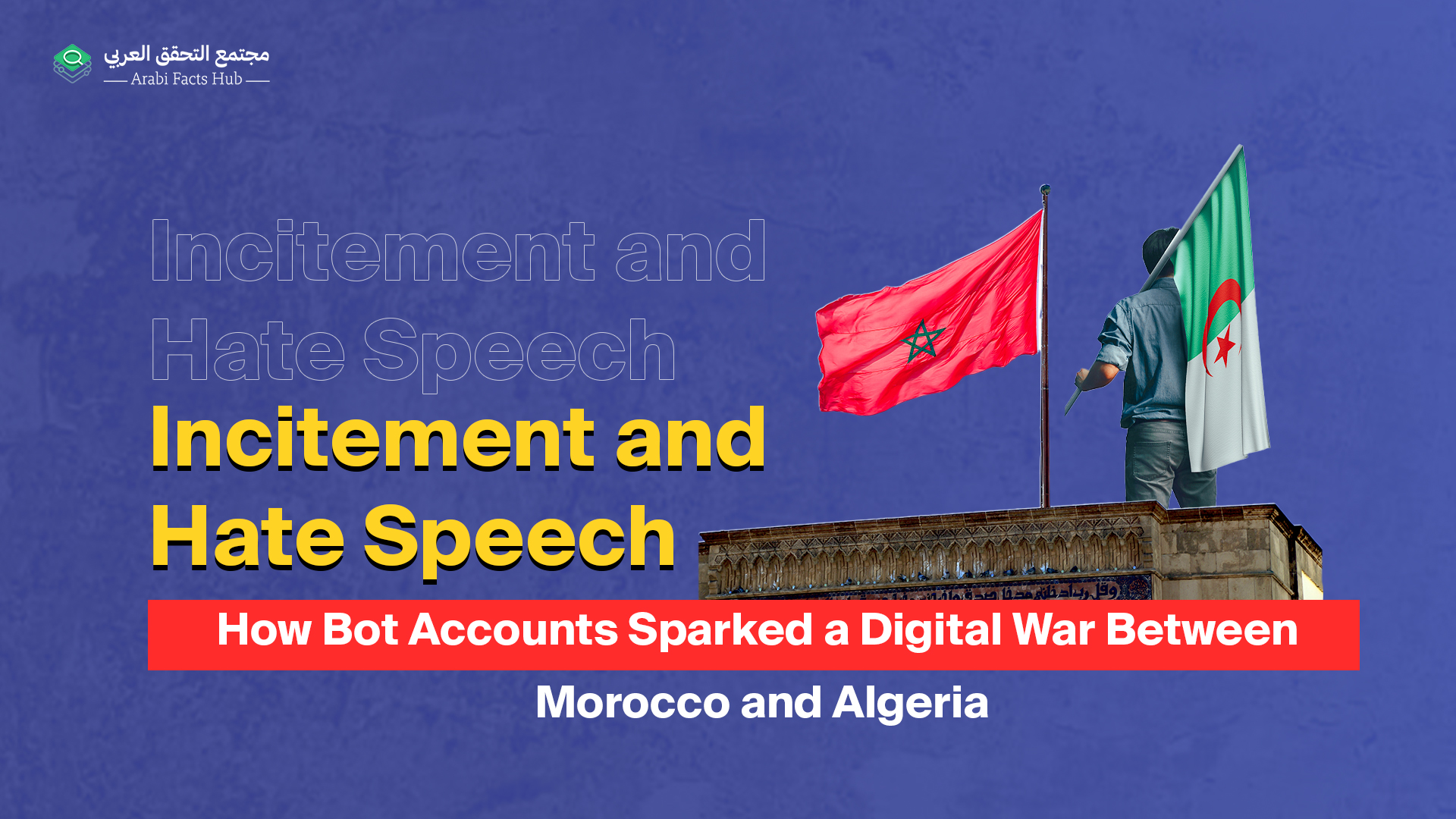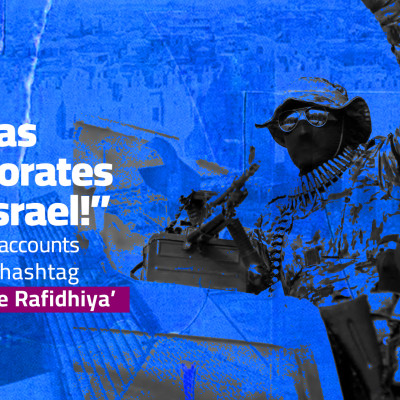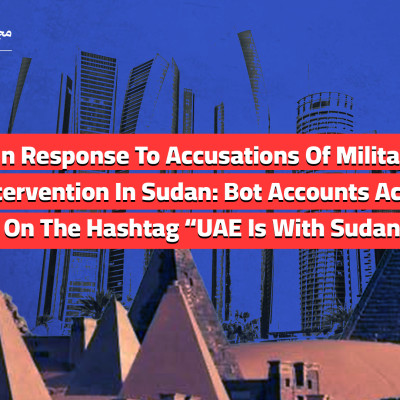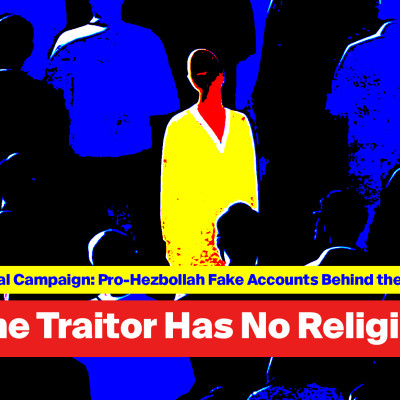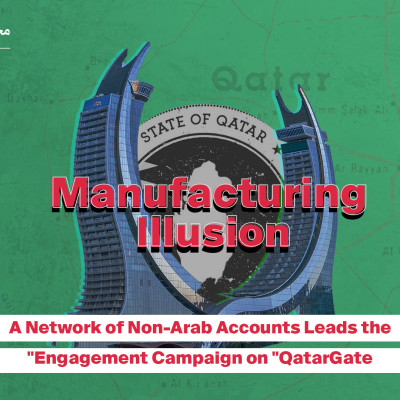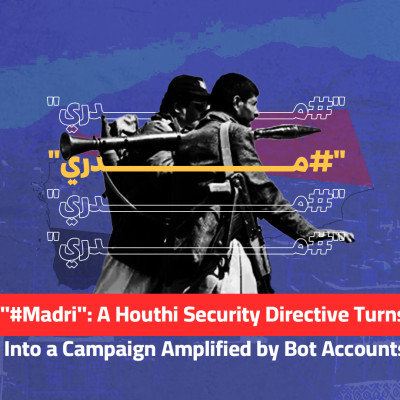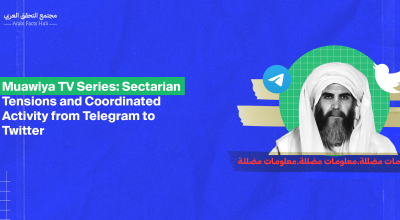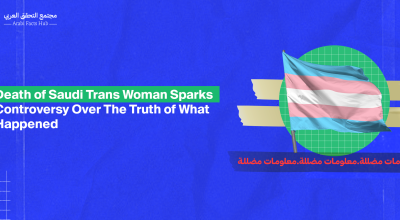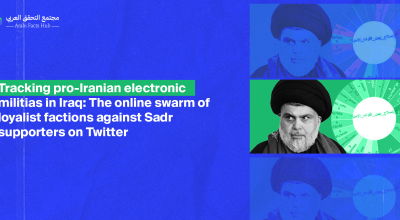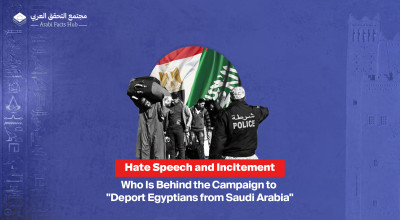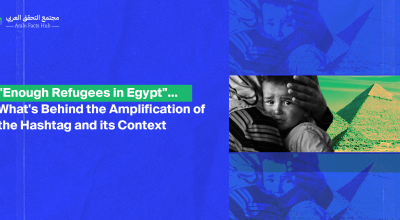In response, a Moroccan counter-campaign quickly emerged online, calling for the expulsion of Algerians from Morocco. It accused Algeria of “terrorism” and called for isolating the country internationally. Both campaigns were led by fake or automated accounts known for spreading incitement and inflammatory rhetoric.
Algerian Campaign Against Migrants
We searched for content calling for the expulsion of migrants using digital search tools with phrases like "expulsion + from Algeria" or "deportation + from Algeria." It turned out that the first appearance of these expressions in 2025 was on February 13, 2025, when the newly created account @momodeja179022 reposted a publication from another newly created account called @NancyDz21, attaching several hashtags — all inciting against Moroccans in Algeria and attacking Morocco.
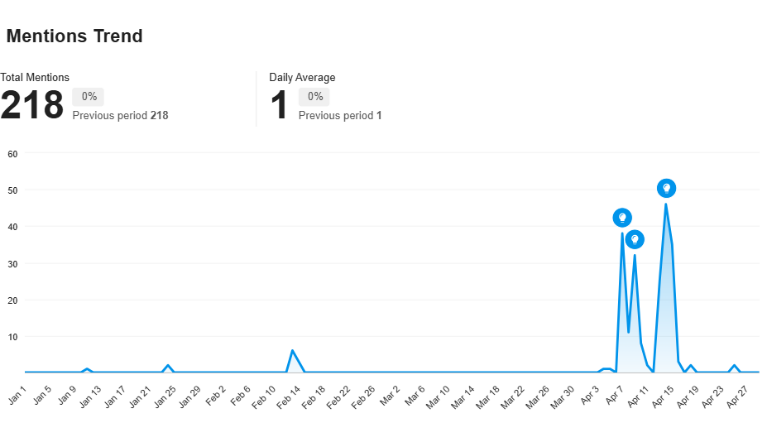
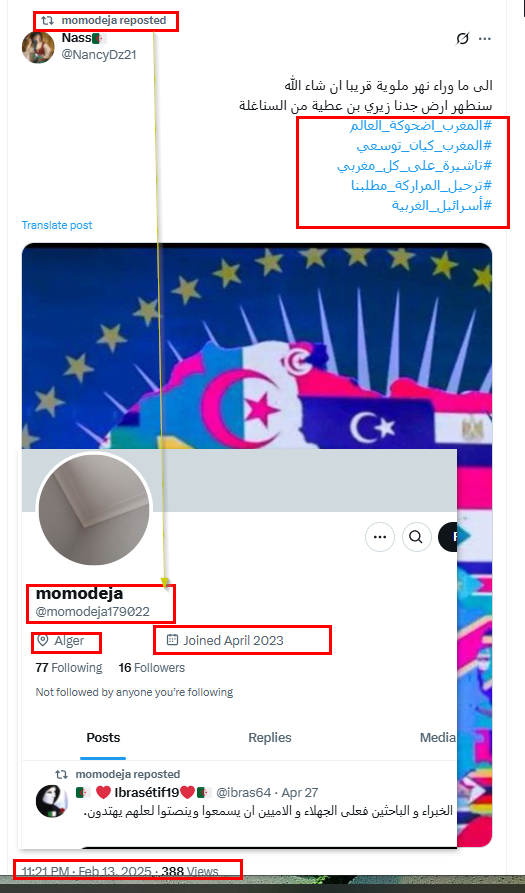
On April 5, 2025, the number of posts inciting against Moroccans in Algeria began to increase. Just two days later, on April 7, 2025, the number of such posts rose significantly after the newly created account @M23294Dzmaka8 published a post calling for the closure of the border between Algeria and Mali, and for the deportation of Malians from Algeria.
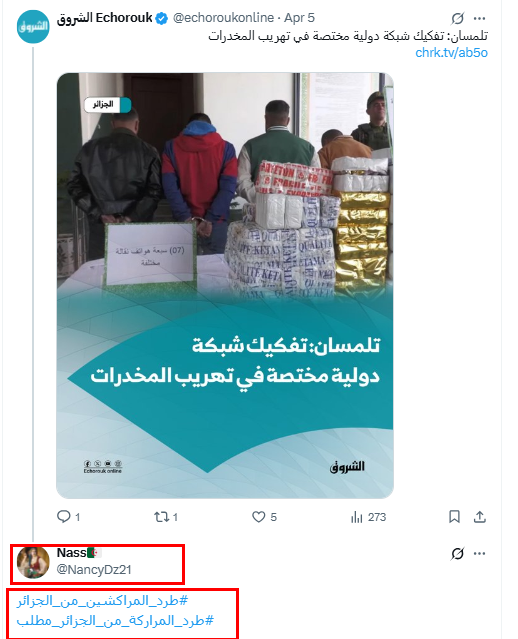
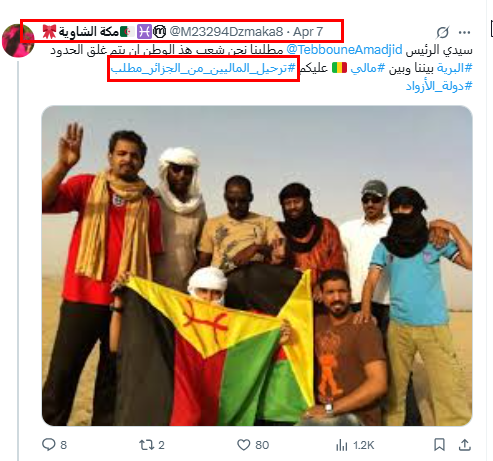
The incitement campaign reached its peak on April 13, 2025, when the account @NancyDz21 published a post combining the two hashtags: #طرد_المراركة_من_الجزائر_مطلب (Expelling Moroccans from Algeria is a demand) and #ترحيل_الماليين_من_الجزائر_مطلب (Deporting Malians from Algeria is a demand). The post reached 151,000 views during the first four months of 2025.
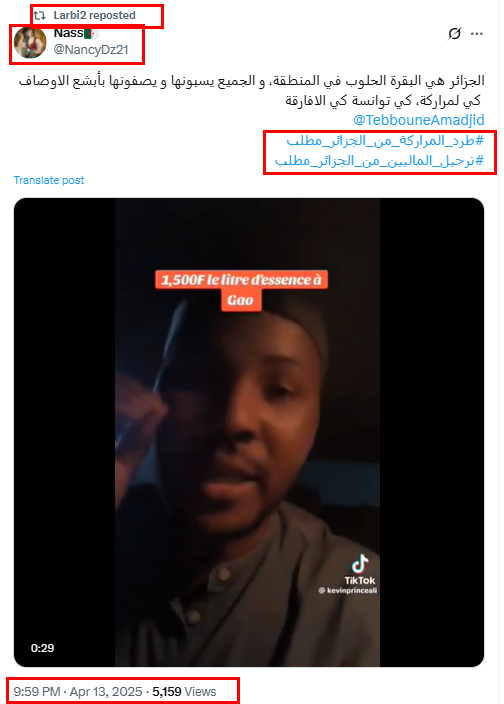
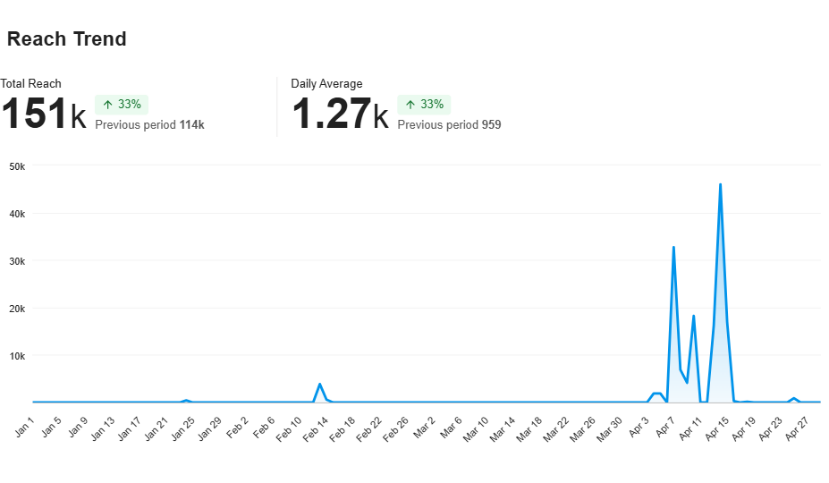
However, this spread was not organic; analyses showed that the combined rate of reposts and quote tweets made up about 60% of the total number of posts, while original content accounted for only about 4% of the total.

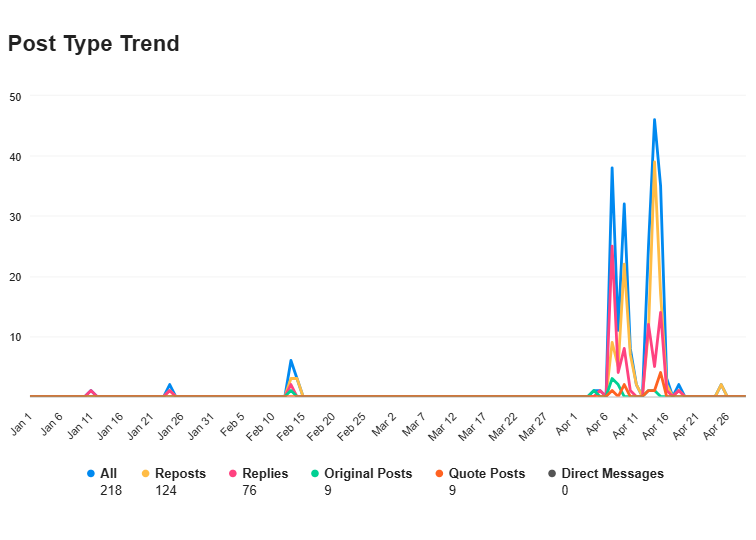
Although the list of trending hashtags and the most used word cloud showed that the hashtag #ترحيل_الماليين_من_الجزائر_مطلب (Deporting Malians from Algeria is a demand) was the most frequently used, the number and intensity of hashtags and inciting language against Morocco were greater and more aggressive. This indicated that the incitement campaign against African migrants in Algeria was merely a secondary campaign accompanying a larger, more prominent one targeting Morocco.
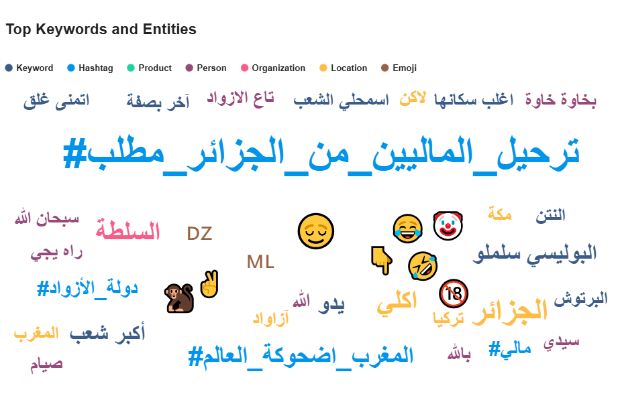
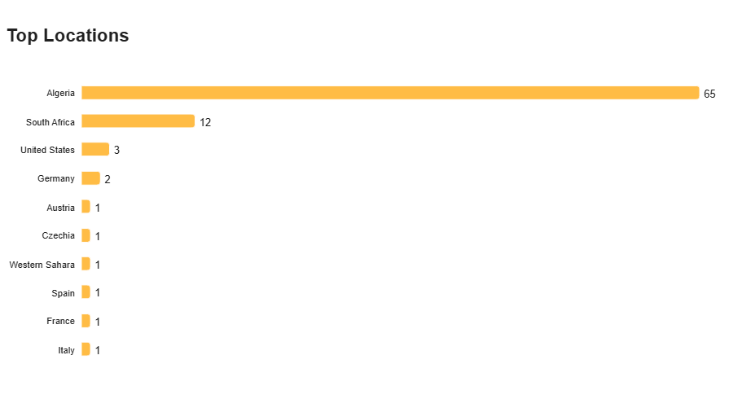
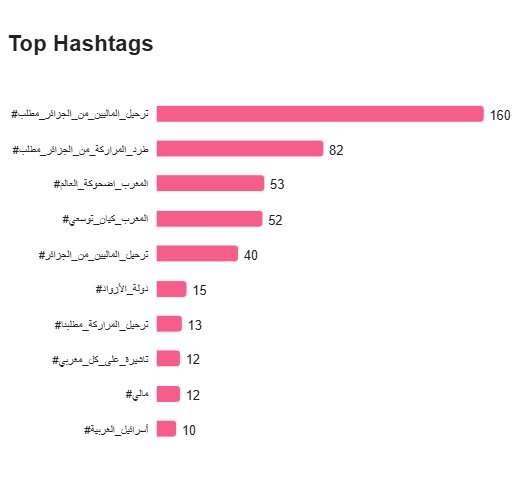
Algerian Incitement Campaign Against Moroccans
We returned to the Meltwater tool to search this time for hashtags we had identified as being linked to the campaign against migrants, such as: #طرد_المراركة_من_الجزائر_مطلب (Expelling Moroccans from Algeria is a demand), #ترحيل_المراركة_مطلبنا (Deporting Moroccans is our demand), #المغرب_اضحوكة_العالم (#Morocco is the world’s laughingstock), #المغرب_كيان_توسعي (Morocco is an expansionist state), #اسرائيل_الغربية (Western Israel), and #المغرب_مقاطعة_فرنسية (Morocco is a French colony). A large number of posts using these hashtags had circulated since last year, but when focusing solely on their usage in 2025, it turned out that the number of posts using these hashtags exceeded 32,000.
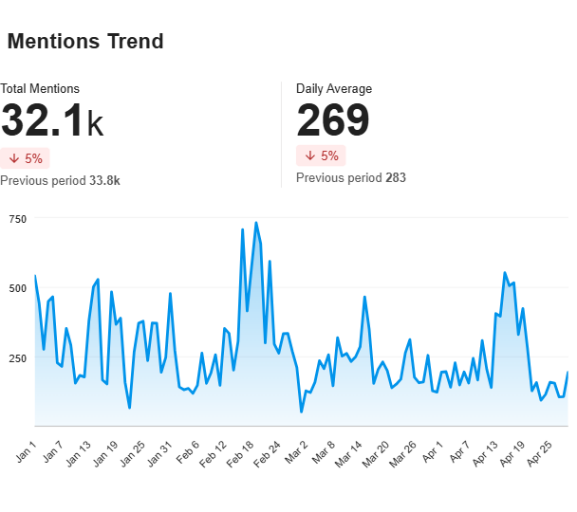
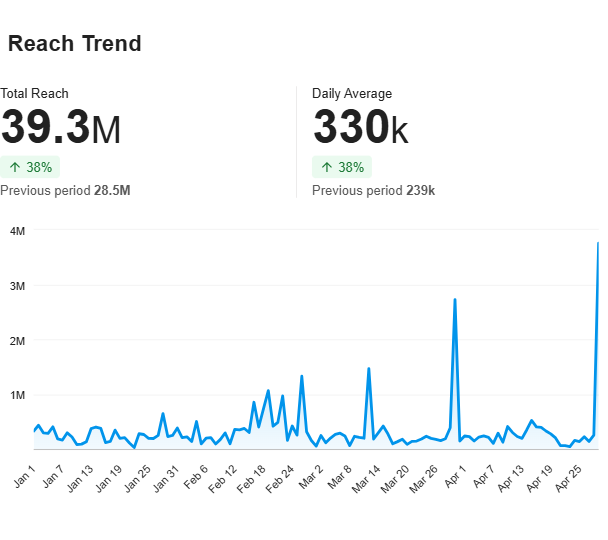
Although the number of posts is declining, their reach and spread continue to rise steadily. Posts have maintained peak visibility since April 29, 2025, surpassing 39 million views. This surge in reach is linked to the posting and interaction patterns around the hashtags. The combined rate of reposts and quote tweets rose to around 50% of total posts, indicating content amplification. Additionally, replies accounted for approximately 43% of the total, suggesting that the campaign’s content sparked widespread debate and controversy. Meanwhile, original content made up only about 6.6% of the total number of posts.
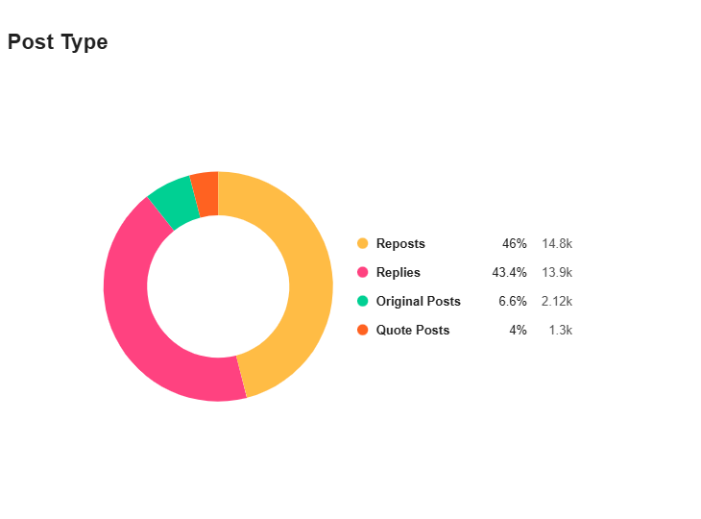
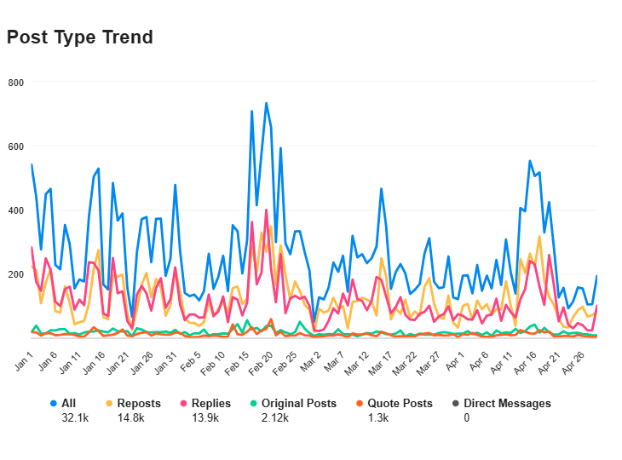
The list of countries to which the users participating in the campaign belong shows that Algeria leads by a wide margin, reinforcing the indication that the campaign is being driven primarily by Algerian accounts. The list also reveals the involvement of a number of Moroccan accounts, with Morocco ranking second—though with a significant gap behind Algeria—followed by France and the United States, with a similar number of accounts from each.

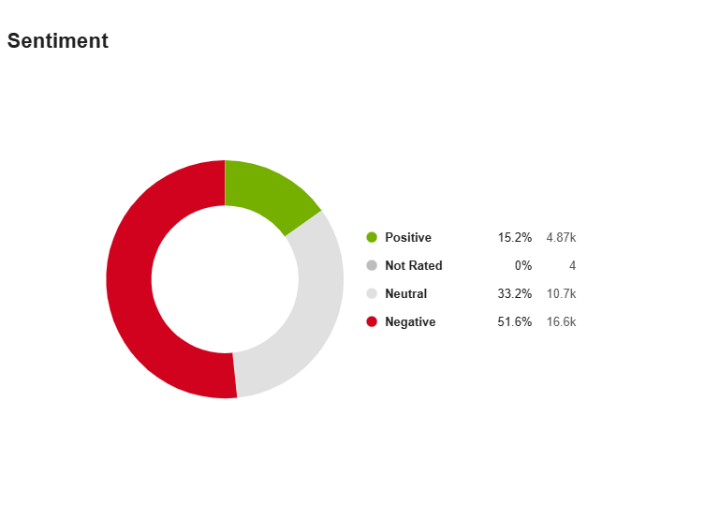
The list of the most circulated hashtags within the campaign showed that the hashtag #المغرب_اضحوكة_العالم (Morocco is the world’s laughingstock) topped the list. This was reflected in the campaign’s most frequently used word cloud, where sarcastic digital expressions and laughing emojis prominently appeared.
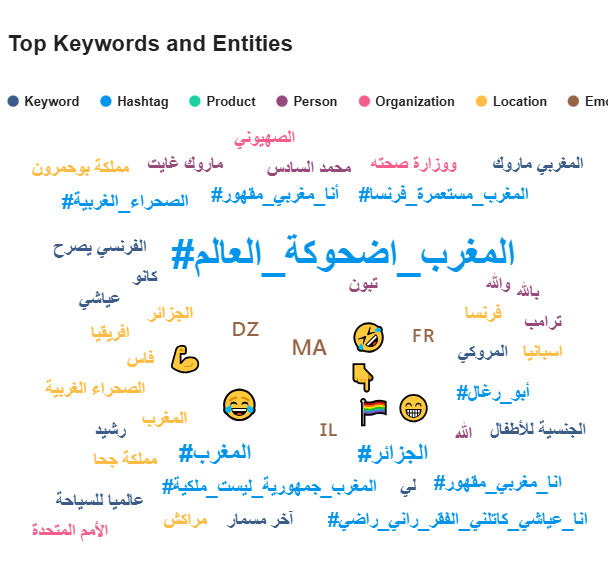
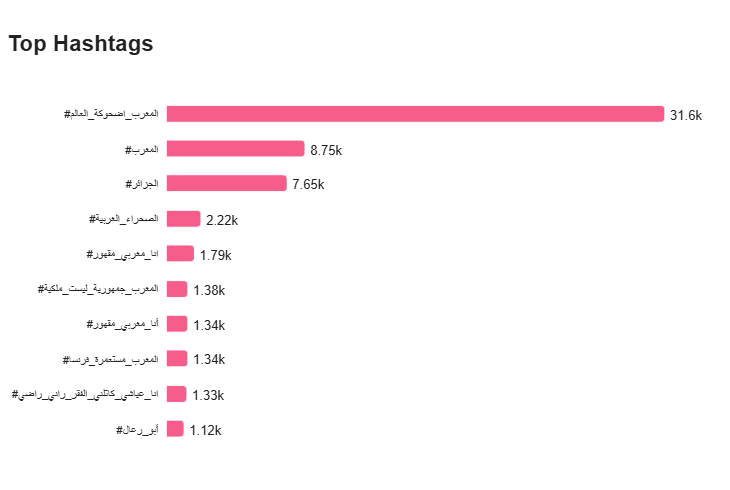
Who Leads The Digital Campaign Against Morocco
Using the Meltwater tool, we extracted a random sample of 20,000 posts from the campaign’s posts on X, published between January 1, 2025, and April 29, 2025, and analyzed their data to identify the list of accounts with the highest engagement in the campaign.
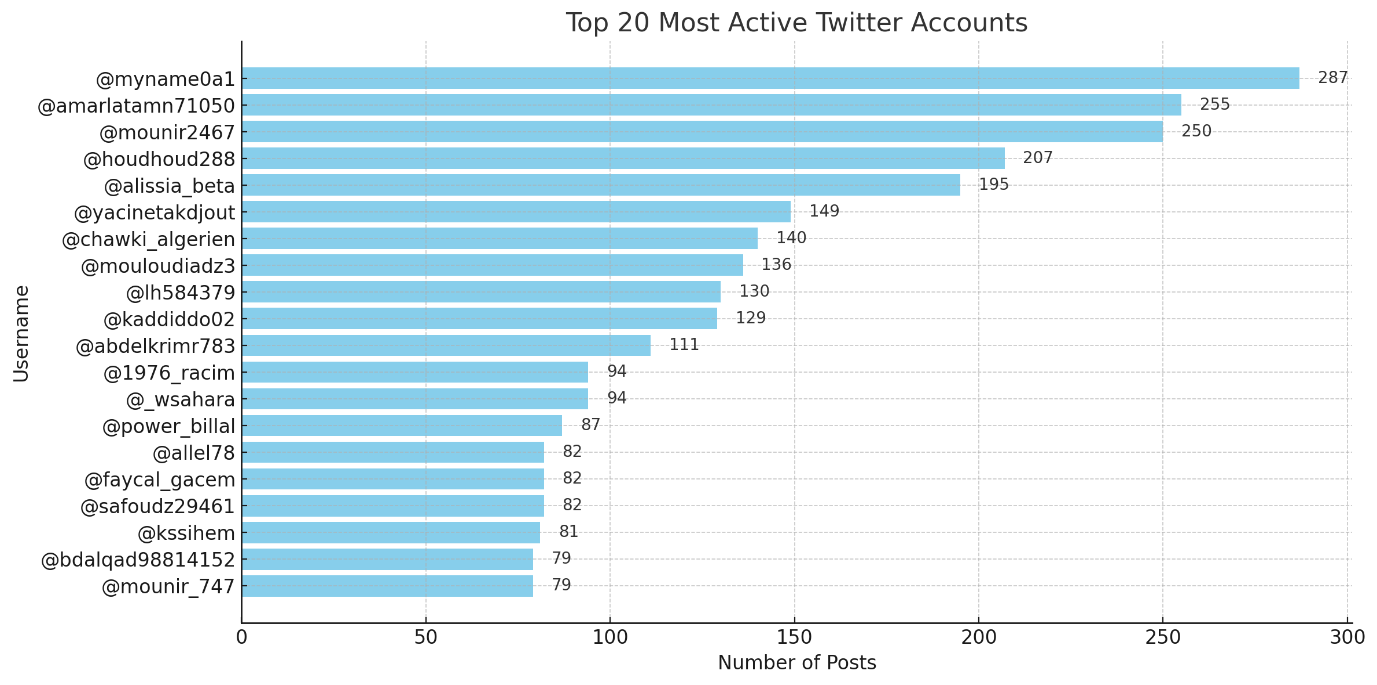
At the top of the list was the account @myname0a1, which published 287 posts using the hashtags, about 97 percent of which were in the form of replies. Upon examining the account, it was found that it was created in 2022. The account uses a fake profile picture, and both the account name and username are not real, indicating that it is not a personal account.
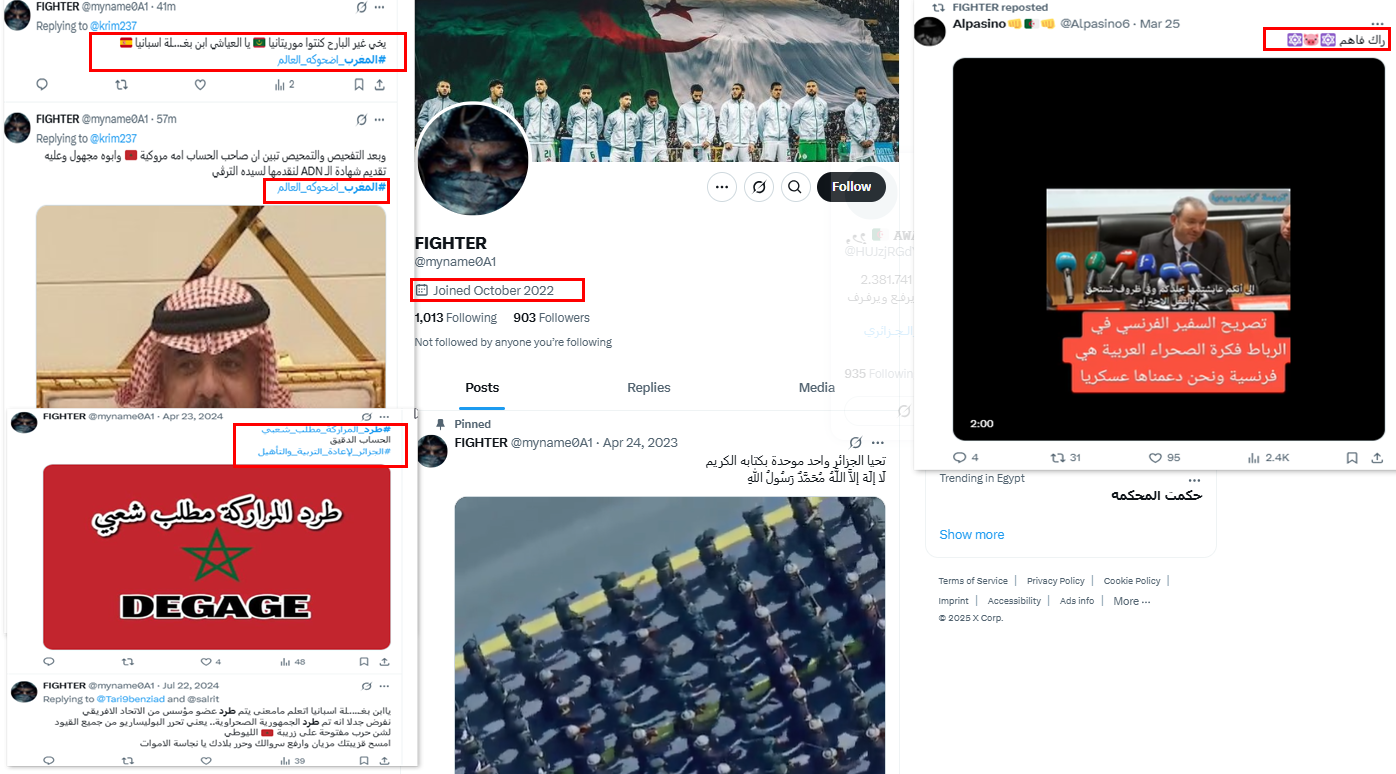
The account actively spreads political propaganda for Algeria and heavily attacks Morocco. This led us to use a code script to examine its interaction patterns. Based on a statistical analysis of its activity times, the account is active 24 hours a day—a non-human interaction pattern. Additionally, it is highly active at specific times and posts a large number of posts and replies with intervals ranging between zero and five minutes, indicating strong evidence that it is an automated, non-human account.
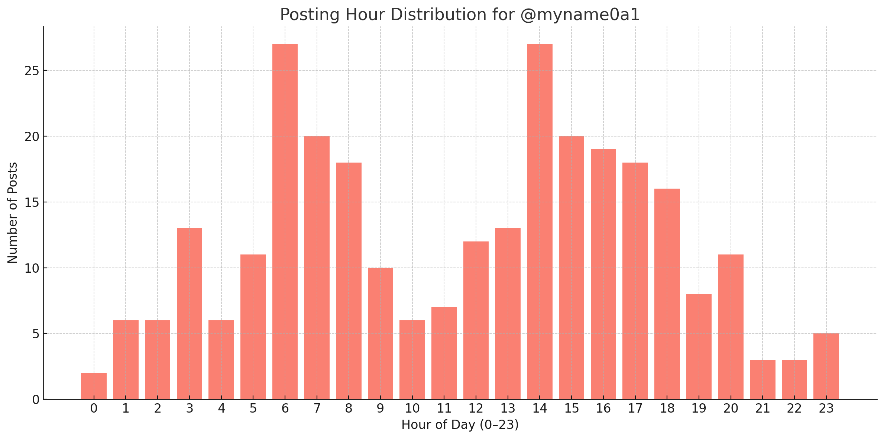
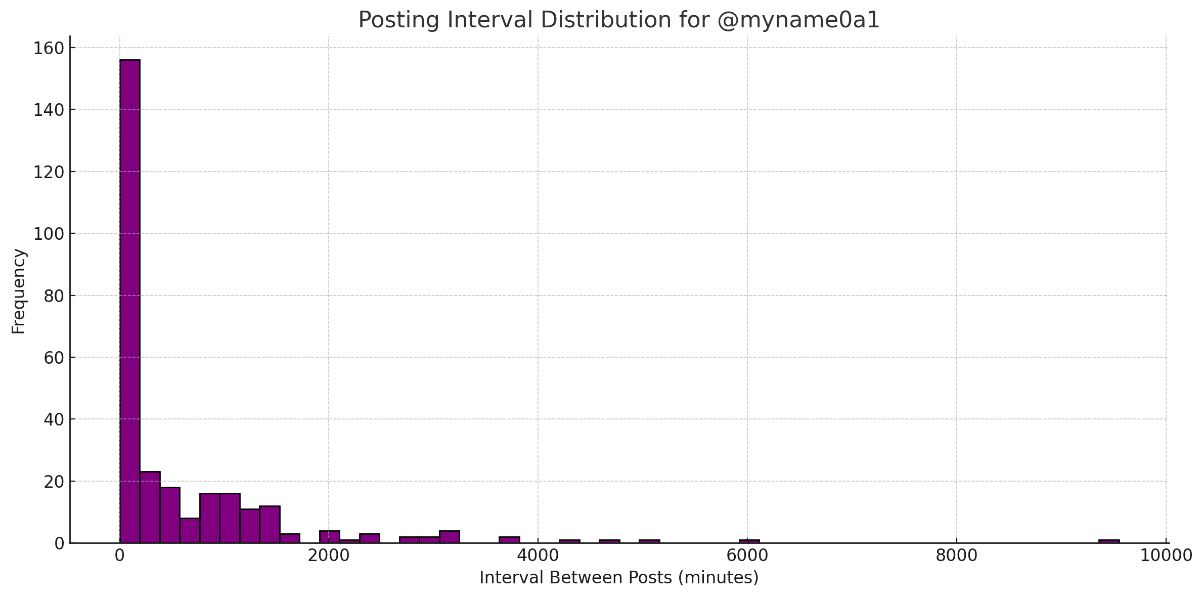
We applied the same analysis to the second account on the list of most engaged accounts, which is @AmarLatamn71050. This account published 255 posts, about 90% of which were reposts. Upon examining the account, it was found to match the previous one: it is a newly created account, established in 2023, and is active in promoting political content in favor of Algeria and attacking Morocco. This is evident from its posts and replies inciting against Moroccans, as well as its use of racist language to describe African migrants.
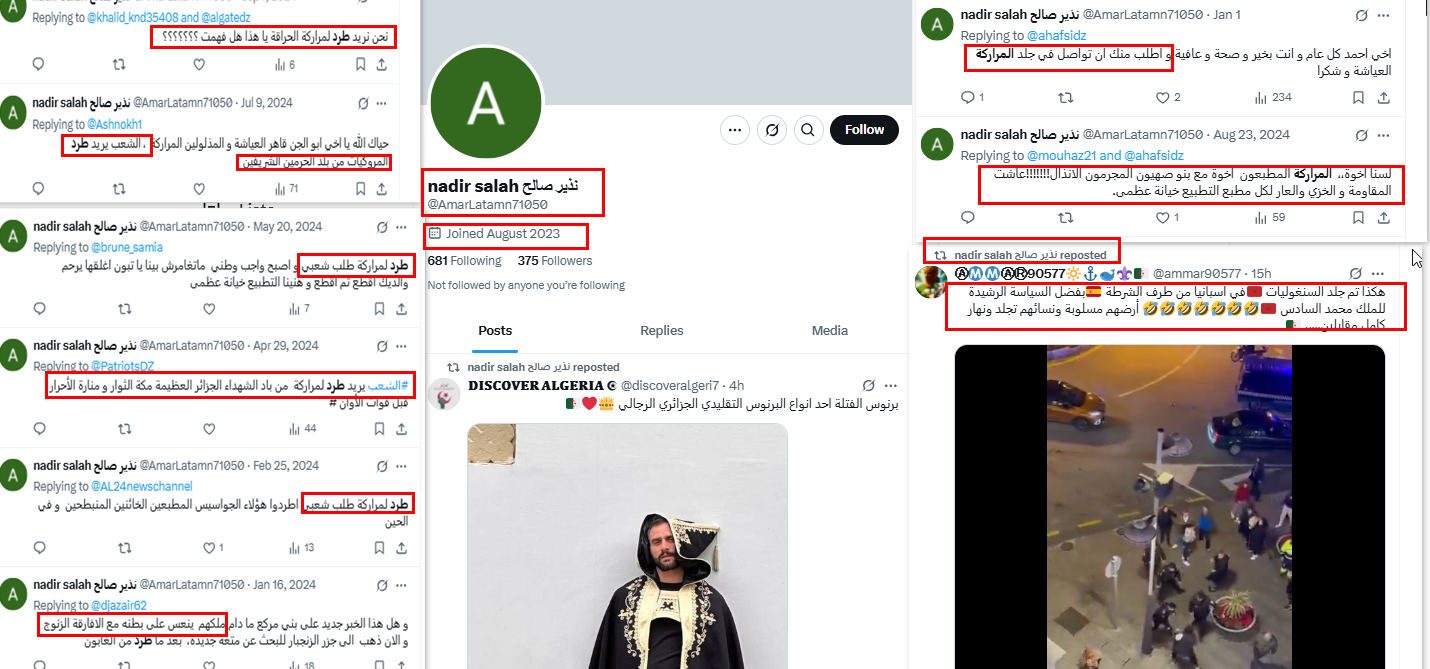

In addition to the absence of a profile picture and the presence of a username that differs from the account name, a social media analysis indicated that the account is active 24 hours a day—a non-human interaction pattern. It tweets intensively at very short intervals, often close to zero, which strongly suggests that it is an automated, non-human account.
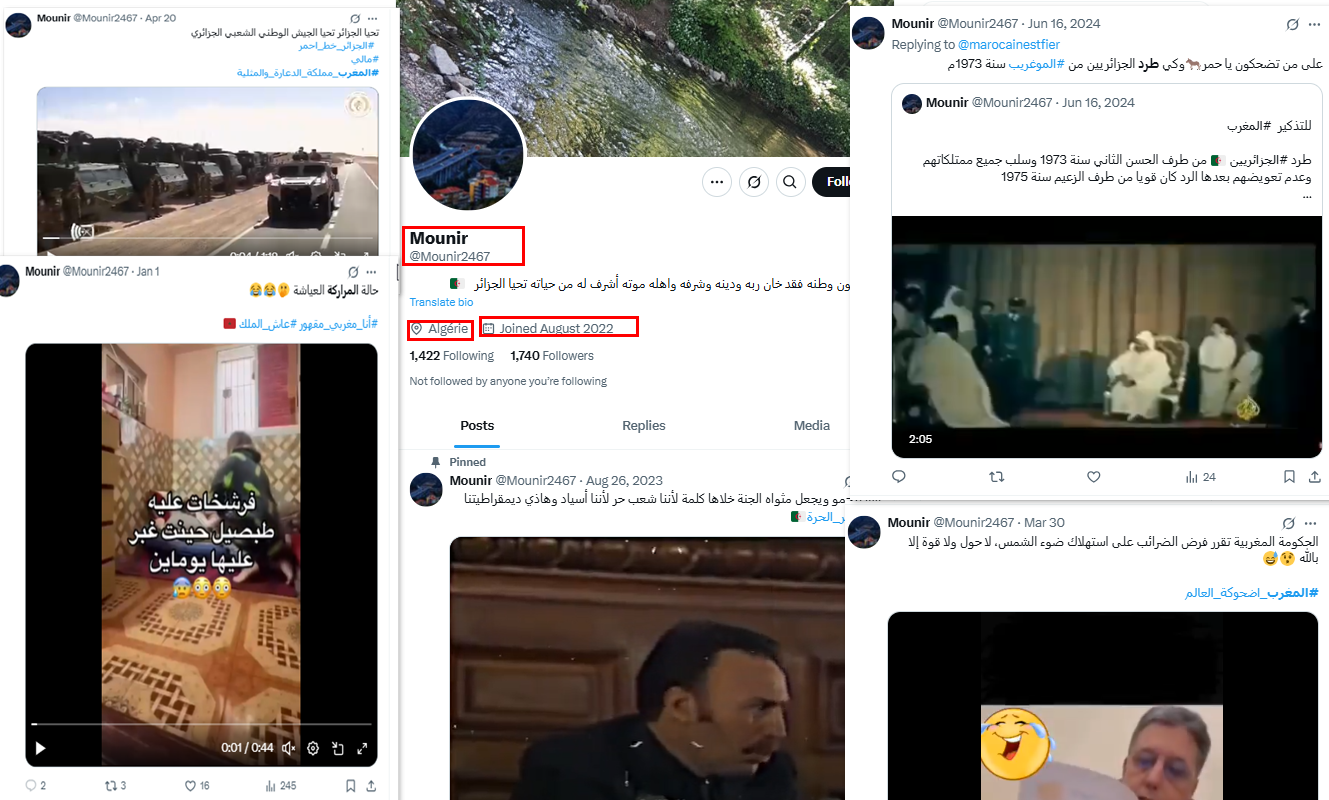
Similarly, the account @mounir2467 has the same pattern. It published 250 posts, the majority of which were in the form of replies. It is also a newly created account that promotes political propaganda for Algeria and attacks Morocco. A social media analysis showed that it remains active 24 hours a day and posts intensively at specific times with very short intervals—often close to zero—indicating that it is an automated, non-human account.

As for the remaining accounts on the list, they are no different from the ones we analyzed. They are all newly created Algerian accounts that use racist rhetoric against sub-Saharan African migrants—one of them is even named "Racism." These accounts show intense activity attacking Morocco and spreading hatred against Moroccans.
.png)
Algerian Influencers Lead the Campaign
Although the analysis of the data sample of posts associated with anti-Morocco hashtags revealed that the most active and engaged accounts were automated and inauthentic, the network analysis conducted on the same sample showed the involvement of the accounts of real Algerian public figures in interacting with these hashtags.
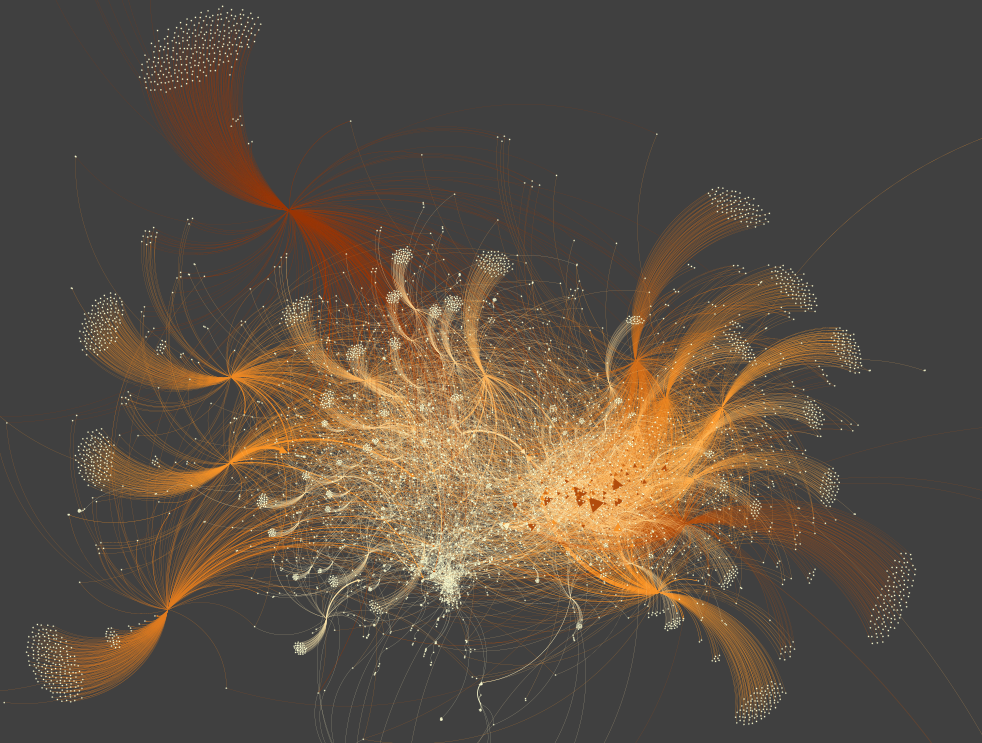
After processing the data and inputting it into Gephi, it became clear that there are central accounts leading the interaction around the anti-Morocco hashtags. These accounts appear in the network graph, color-coded from yellow (less central) to red (more central). At the top of the map, we see the cluster of red accounts, positioned as if overseeing the activity of the other accounts—suggesting they play a supervisory or coordinating role in the campaign.
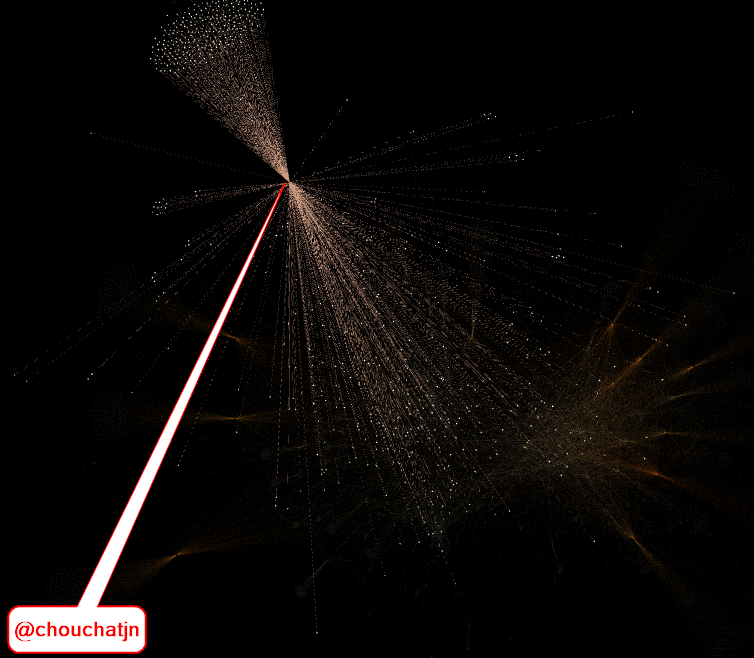
It was found that the central account in this red network cluster is a newly created account named “شهد” (Shahd) @chouchatjn. Although the analysis of its activity patterns—including posting times and the consistency of its engagement with the hashtags—suggests that it isnot automated, its archive contains no personal content whatsoever. Instead, it is entirely dedicated to posting political propaganda in support of Algeria and relentlessly attacking Morocco.
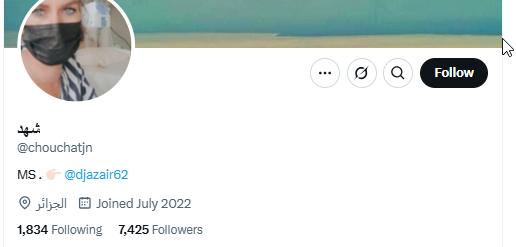
A search through the archive of the “Shahd” account revealed that it engages heavily with another account—consistently replying to and reposting its content. This account belongs to Algerian journalist Ahmed Hafsi, who works as a presenter for Alaraby TV Network and has been residing in the United Kingdom since 2020, after leaving his position at Ennahar TV in Algeria, where he had worked since 2012. Hafsi is widely known for his continuous criticism and attacks on Morocco.
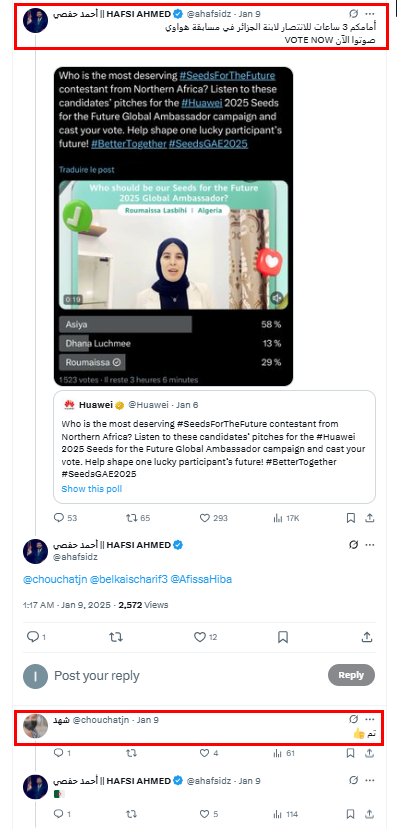
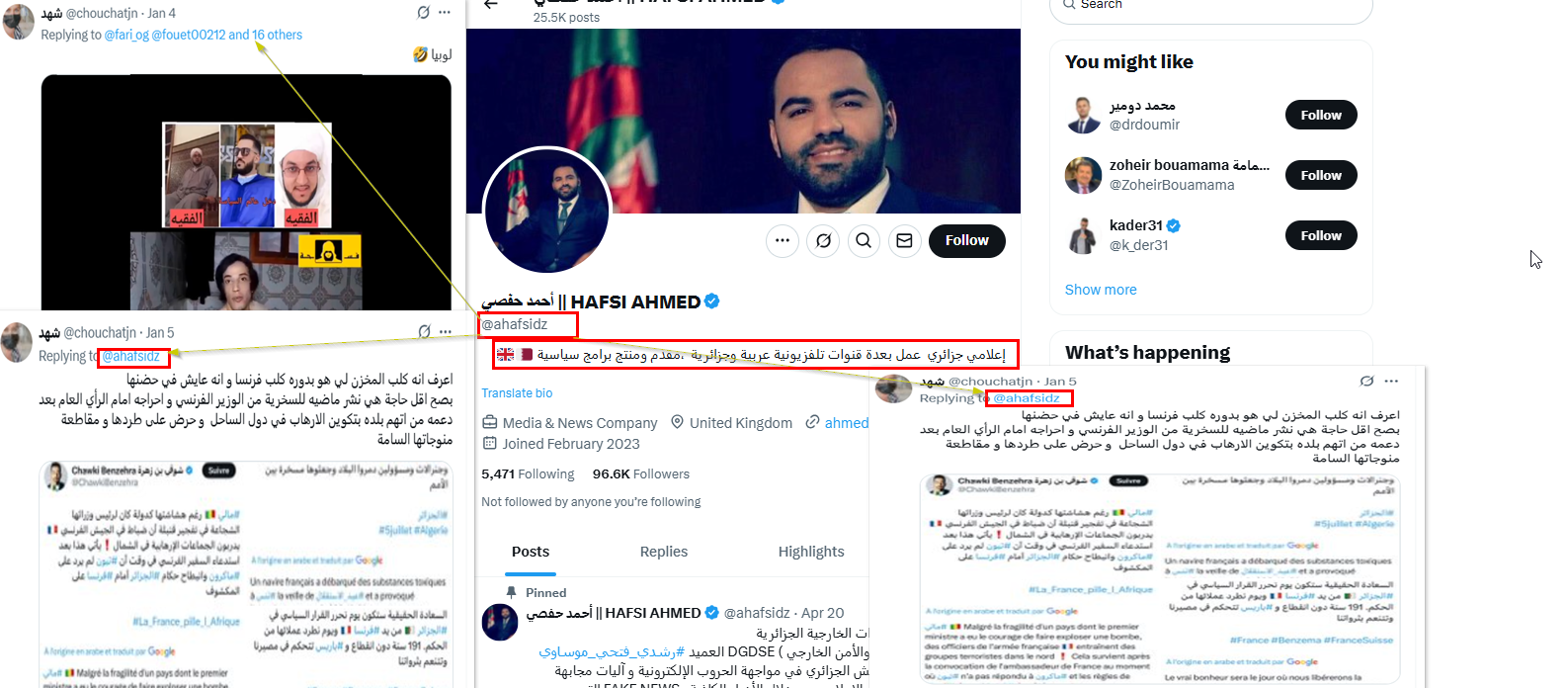
Hafsi's account appeared on the network analysis map as one of the central accounts that many others in the core of the network interact with. Among the accounts most actively engaging with Hafsi is another central account in the network with the handle DZ @MouloudiaDZ3.
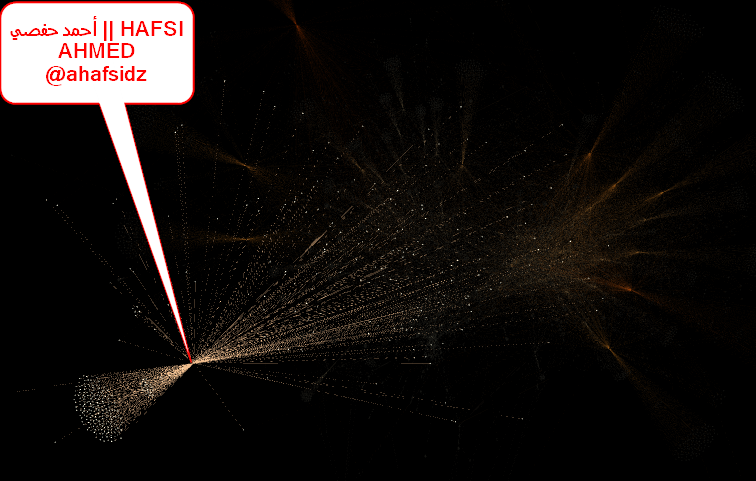
This account describes itself as “a page for defending Algeria and promoting its heritage without the slightest regard for others’ feelings.” It appears to be a backup account for an older one, originally created in 2009. As its bio suggests, the account’s posts focus primarily on political propaganda in favor of Algeria and attacks on Morocco. It also appeared on the network analysis map as one of the central accounts, heavily interacted with by other accounts in the network—both through comments and reposts.
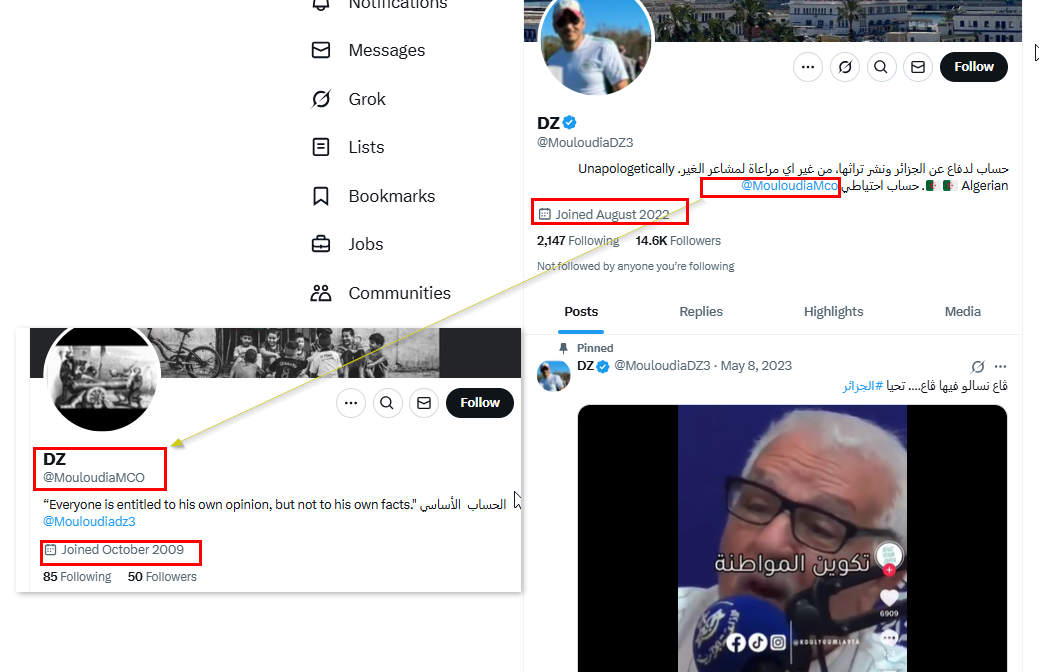
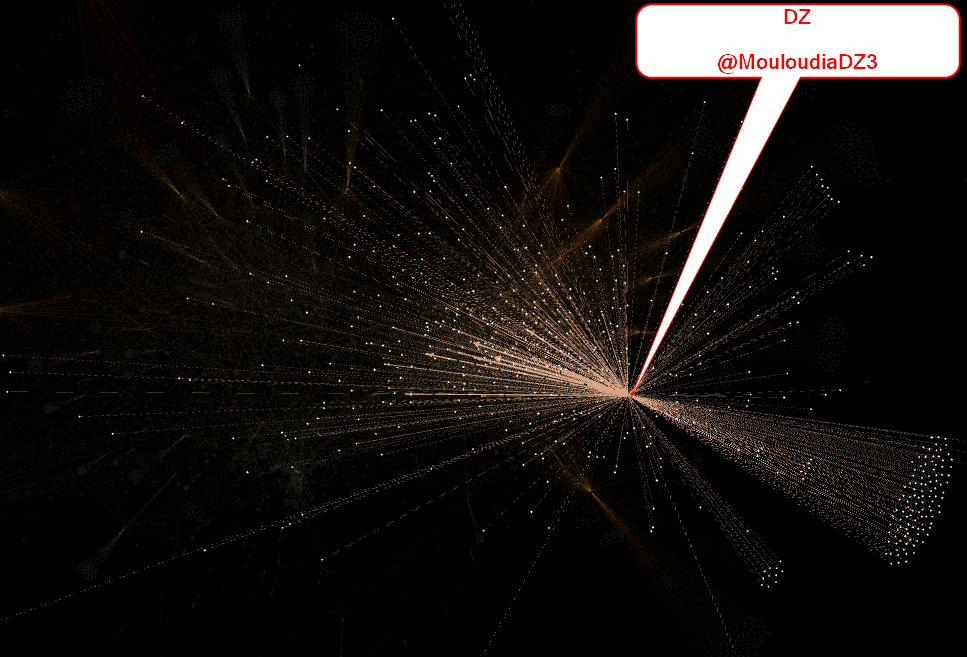
Among the most important central accounts interacting with it are the accounts of “Shahd” and Ahmed Hafsi, along with another Algerian journalist’s account named AMINE MELLIT / "أمين مليط" (@AmineMellit).
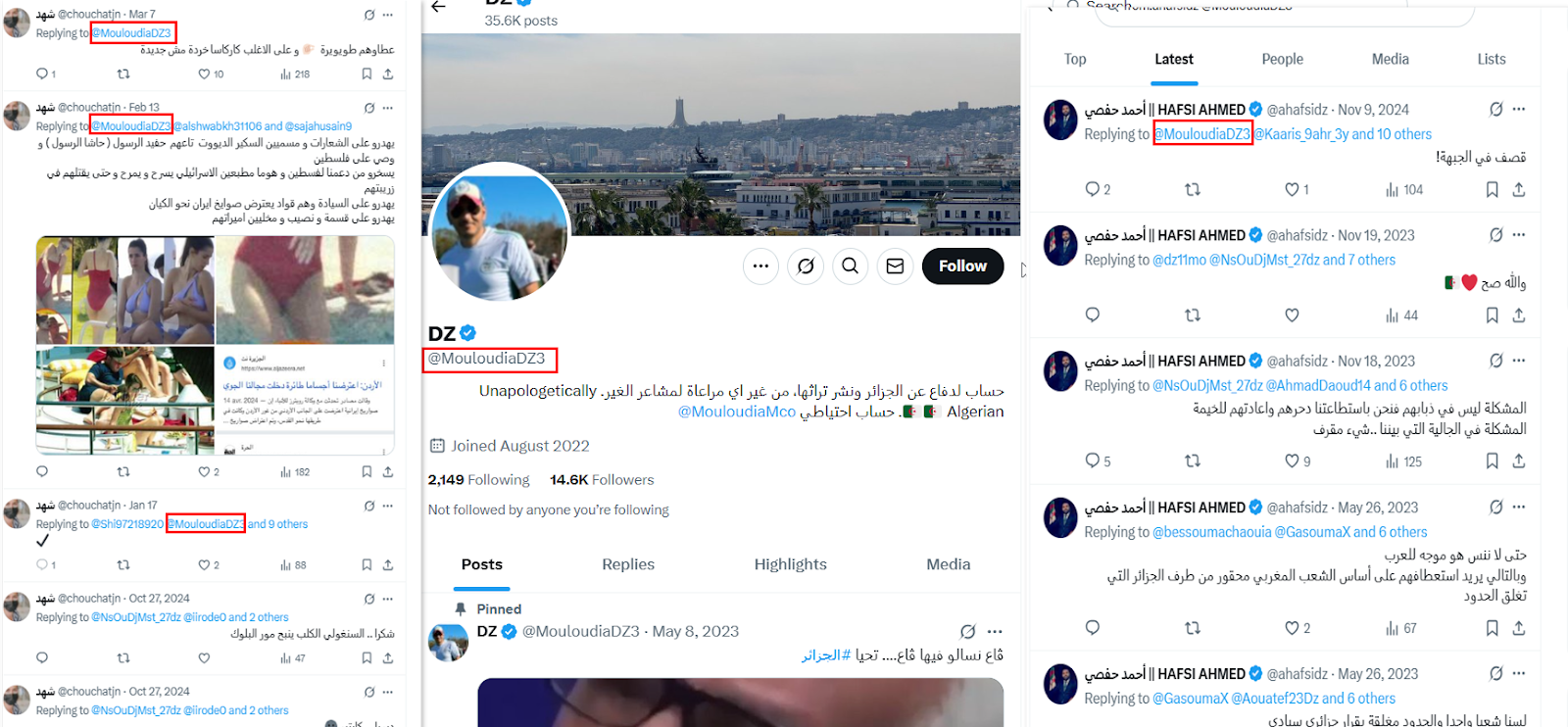
Mellit worked as a presenter on several Algerian satellite channels, such as 'El Bilad', 'Echorouk News', and 'Numidia'. Despite this, he uses a recently created account and does not post any clips indicating that he is still working as a presenter. Instead, he regularly shares clips from a nightly livestream, the content of which either glorifies the Algerian political leadership or attacks Morocco.
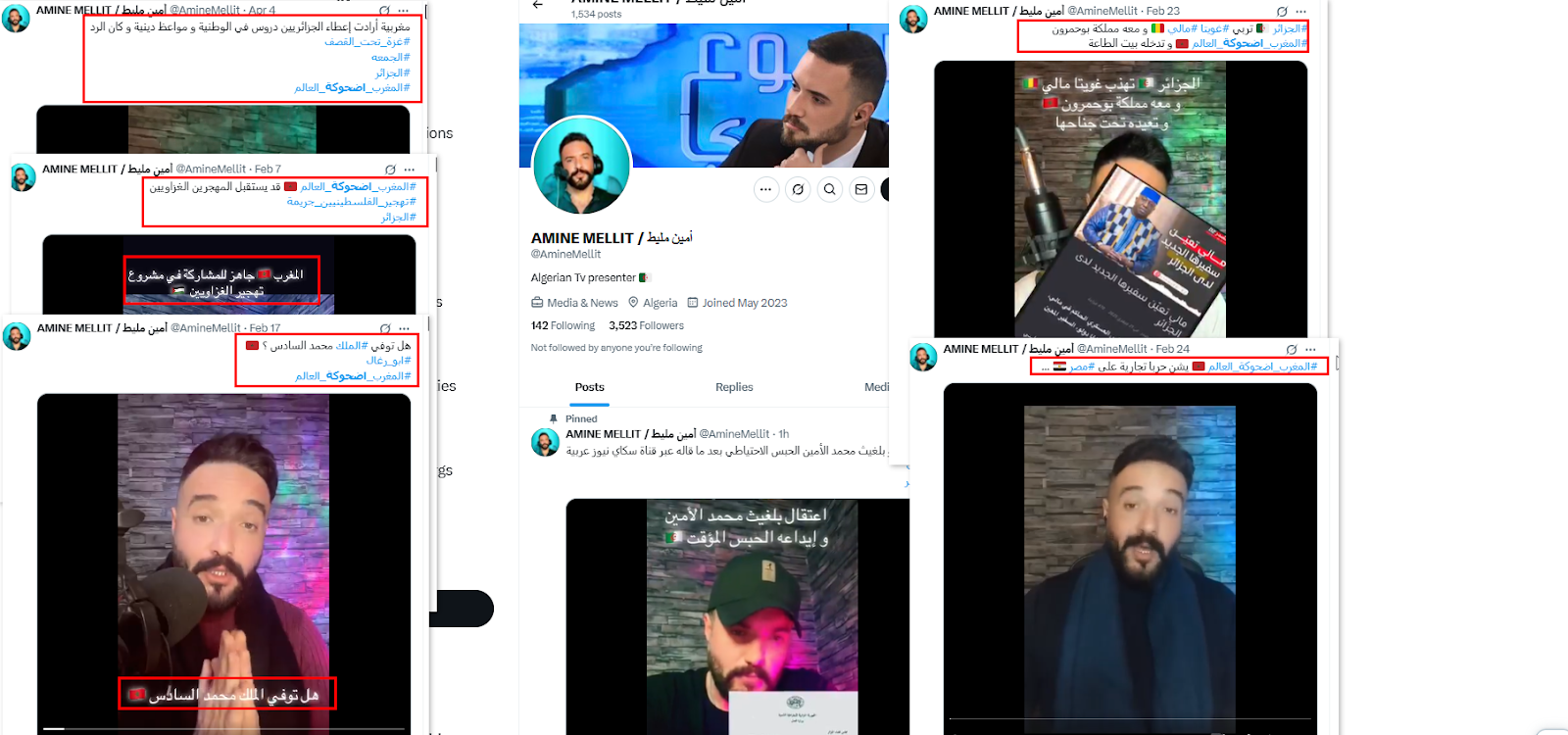
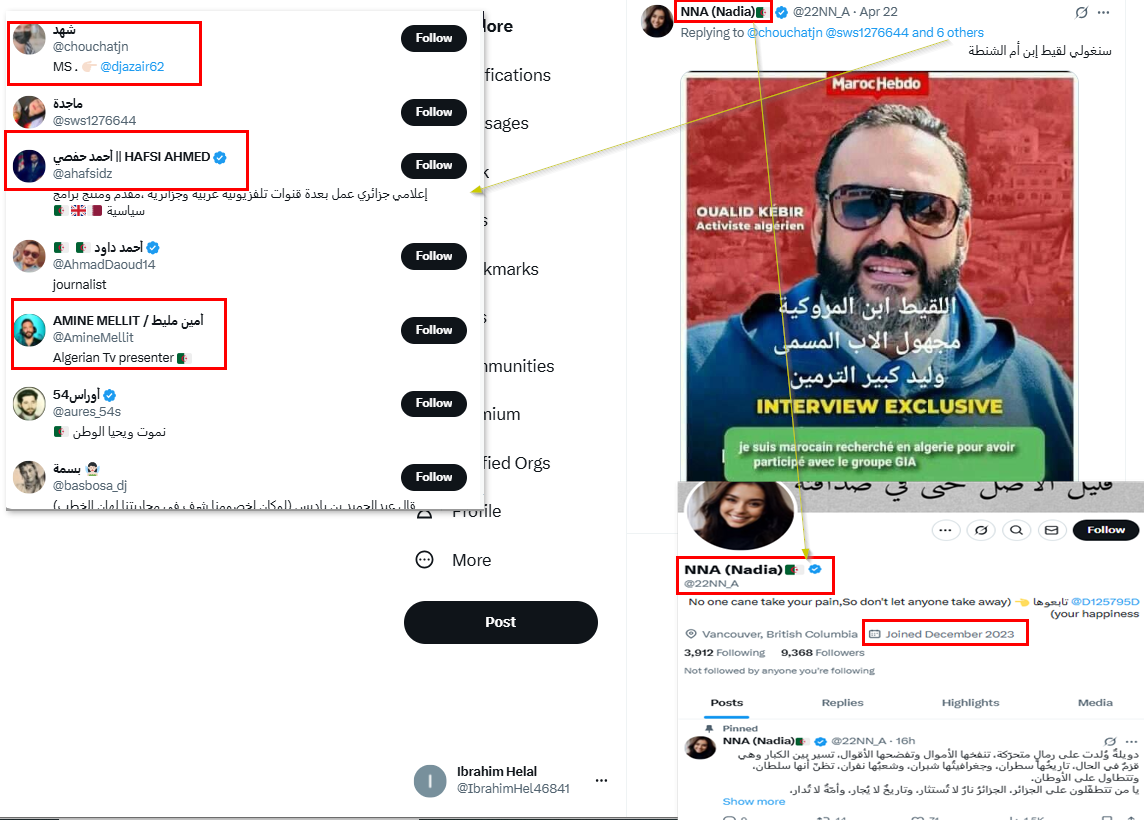
All the aforementioned accounts also interact with another central account called NNA (Nadia) @22NN_A; this is another newly created but verified account. It actively praises the ruling regime in Algeria and attacks Morocco, and it is connected to the same network of accounts in which journalists Hafsi and Mellit feature prominently.
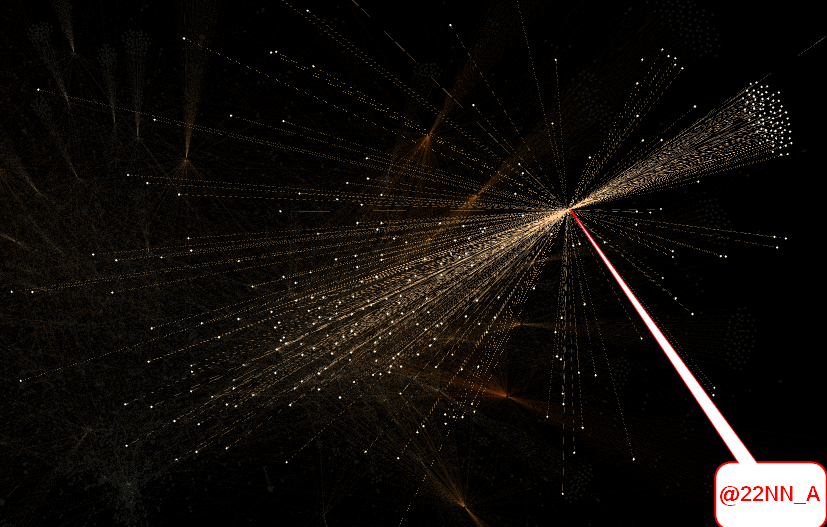
As shown in the network analysis map, these central accounts surround all the accounts interacting with the hashtags. On the left side of the interactive map, four central accounts stand out: Shahd, DZ, Hafsi, and Mellit. These accounts receive extensive engagement from other accounts through comments.
On the right side of the network map, four central accounts appear as well, with the addition of NNA (Nadia) @22NN_A, which pumps out content that the other accounts repeatedly share and circulate. This pattern indicates that the group of accounts we identified is leading the interaction around these hashtags, headed primarily by the accounts of Ahmed Hafsi and Amine Mellit.
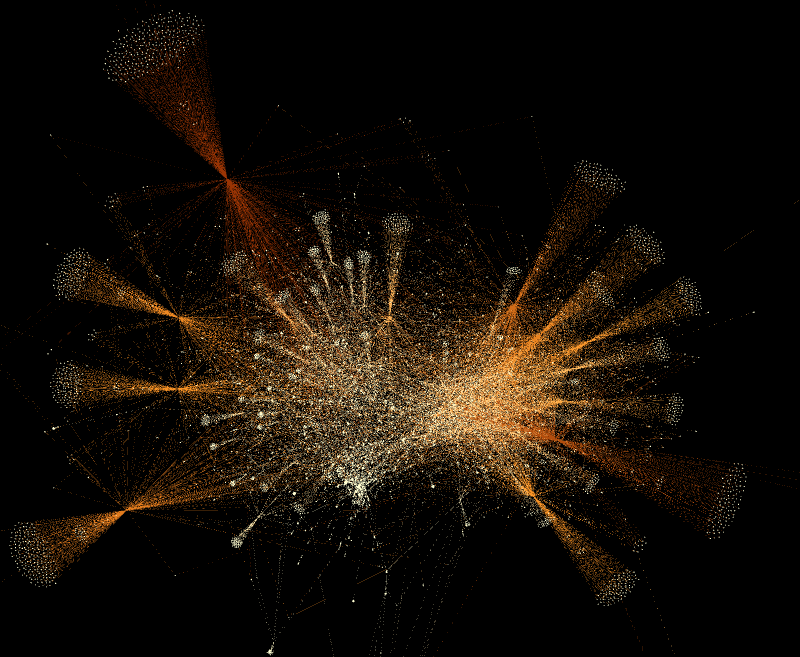
Moroccan Counter Digital Campaign
On the other hand, following the spread of the hashtag #طرد_المراركة_من_الجزائر_مطلب (Expelling Moroccans from Algeria is a demand), Moroccan hashtags attacking Algeria emerged in April 2025, such as #الجزائر_تدعم_الإرهاب (Algeria Supports Terrorism) and #الجزائر_معزولة_دوليا (Algeria is Internationally Isolated). These hashtags reached their peak popularity on April 13, 2025. Although the number of posts using them did not exceed 2,400, they achieved a reach of approximately 2.6 million views.
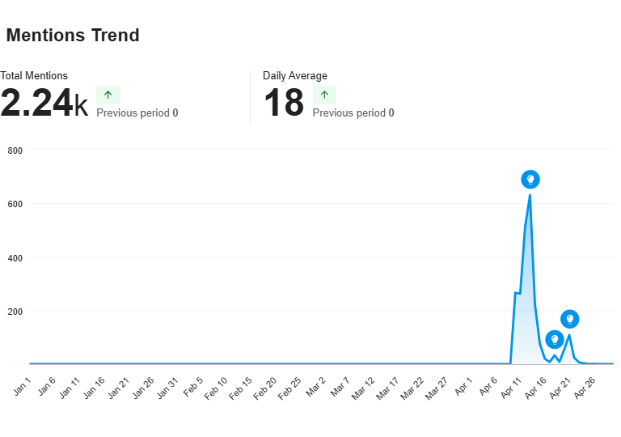
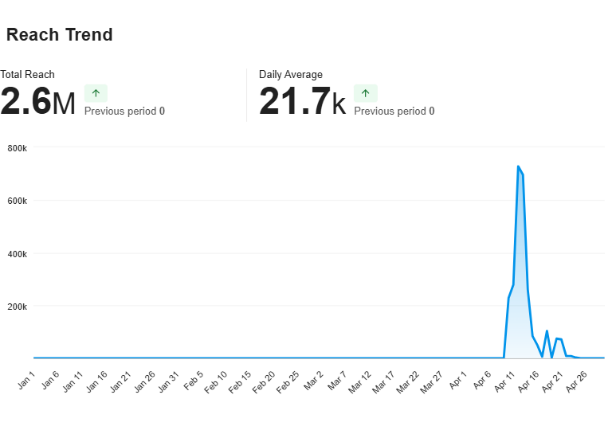
The word cloud and the list of the most frequently appearing hashtags within the posts also showed several other hashtags as a response to the Moroccan campaign, such as: #الجزائر_تدعم_الإرهـ_ـاب (Algeria Supports Terrorism), #الجزائر_معزولة_دولياً (Algeria is Internationally Isolated), #الجزائر_اضحوكة_العالم (Algeria Is the World’s Laughingstock), #الجزائر_الارهابية (Terrorist Algeria), and #الجزائر_سرطان_افريقيا (Algeria Is Africa’s Cancer).
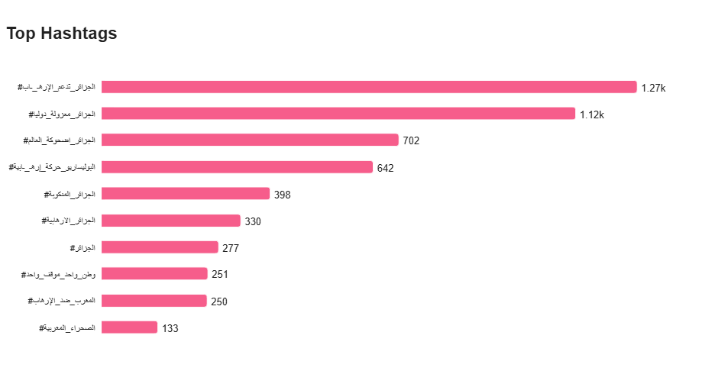
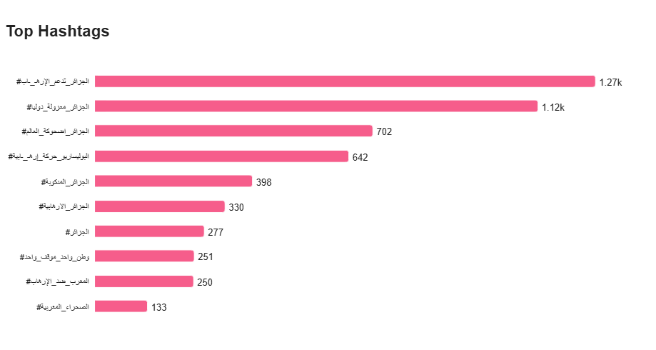
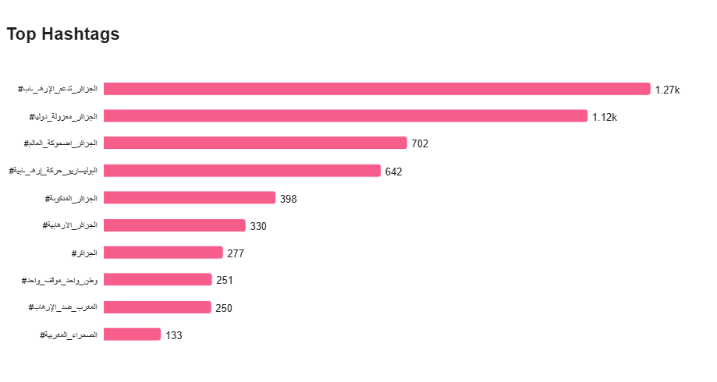
Although the campaign began last year, it is still ongoing. The number of posts increased during the first four months of 2025 to about 60,000, achieving a reach close to 80 million, at an average of 661,000 views per day.
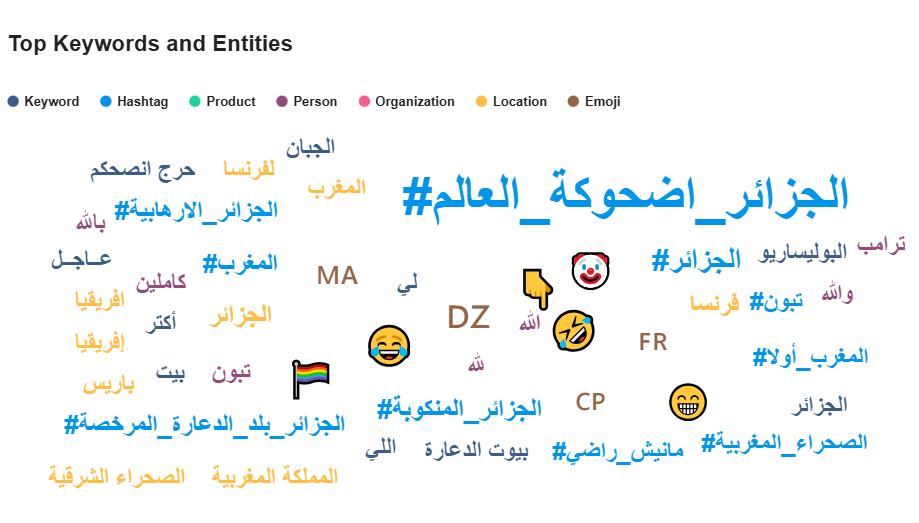
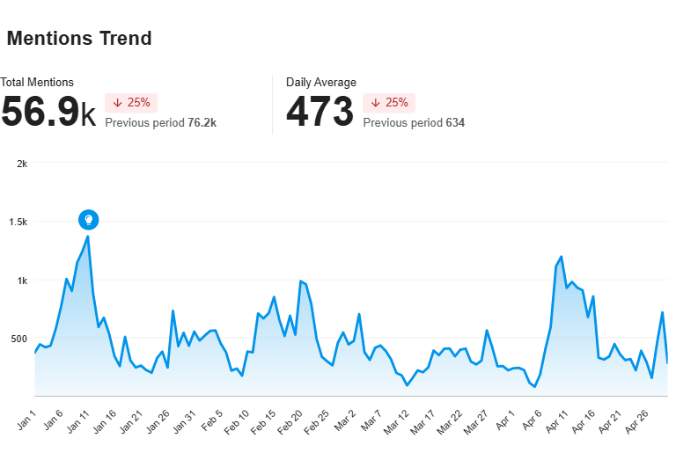
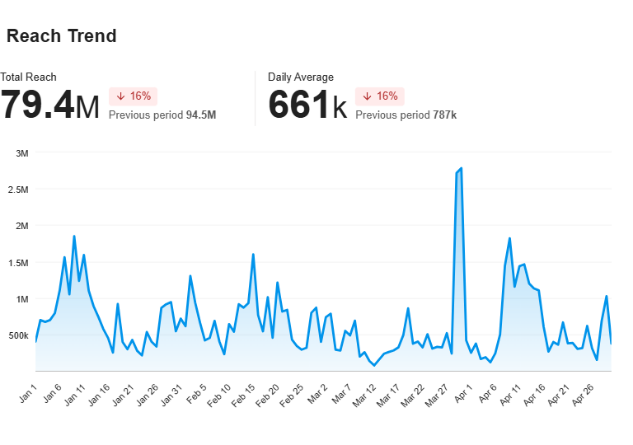
Interaction patterns between the Algerian and Moroccan campaigns were notably similar. In both cases, the combined rate of reposts and quote posts approached 50% of the total number of posts. The high percentage of replies indicates intense debate in the comments—both in support of and opposition to the campaigns. In contrast, original content made up no more than 7% of the total posts in either campaign.
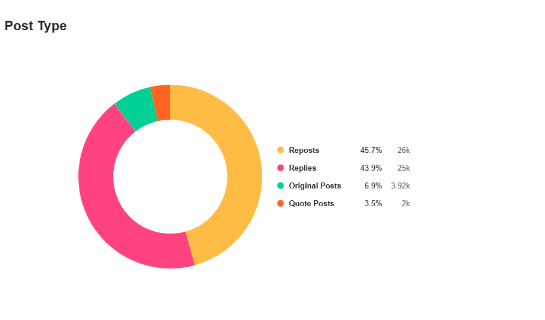
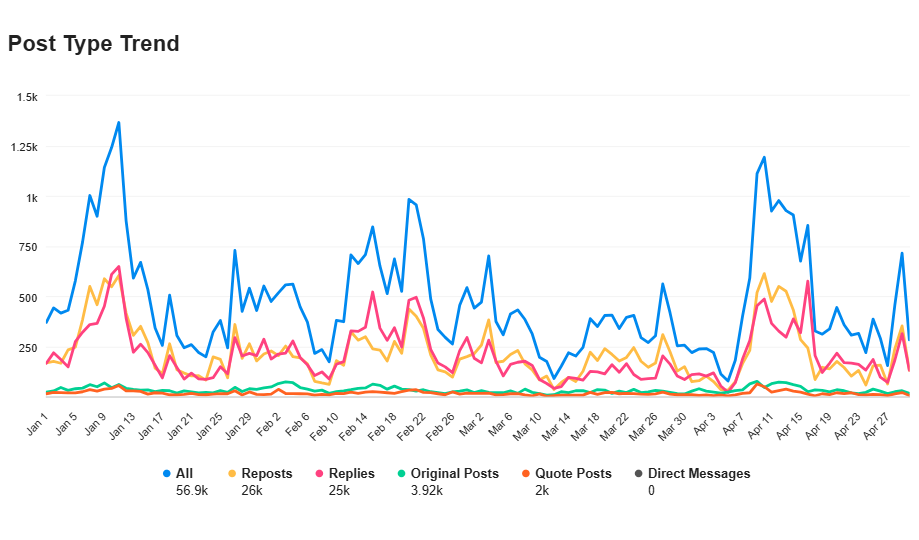
Morocco topped the list of countries from which interactions on the hashtag originated. The hashtag #الجزائر_اضحوكة_العالم (Algeria Is the World’s Laughingstock) ranked first in terms of engagement among the most widespread hashtags. Other hashtags attacking Algeria also emerged, such as #الجزائر_المنكوبة (Disaster-Stricken Algeria) and #الجزائر_بلد_الدعارة_المرخصة (Algeria Land of Licensed Prostitution), highlighting the use of incitement, mockery, and hate speech as key tools in the campaign’s influence strategy.
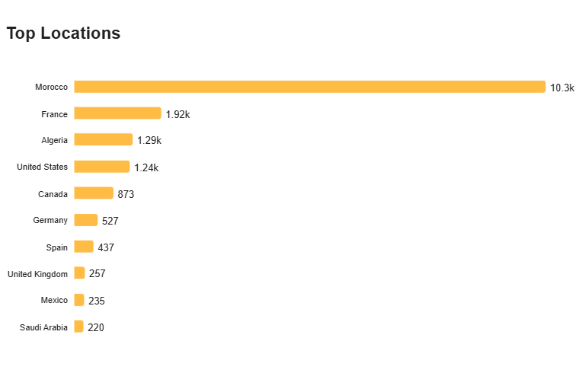
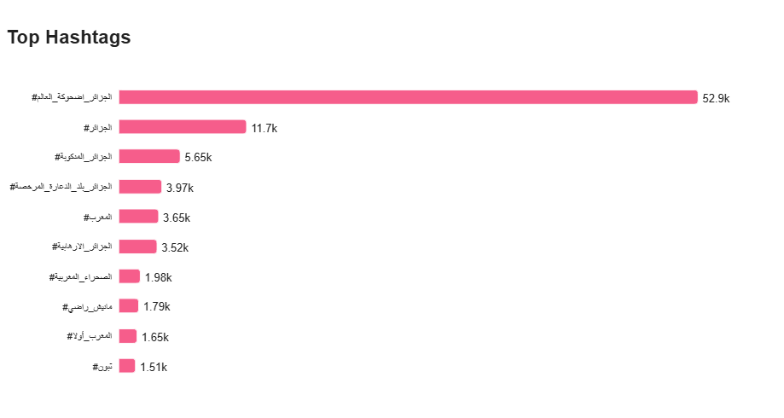
Who Is Leading the Moroccan Campaign Against Algeria
Using the Meltwater tool, we extracted a random sample of 20,000 posts from the previously mentioned hashtags on X. After analyzing the data, we obtained a list of the most active and engaged accounts on these hashtags. We then narrowed it down to the top ten accounts with the highest levels of interaction within the campaign.
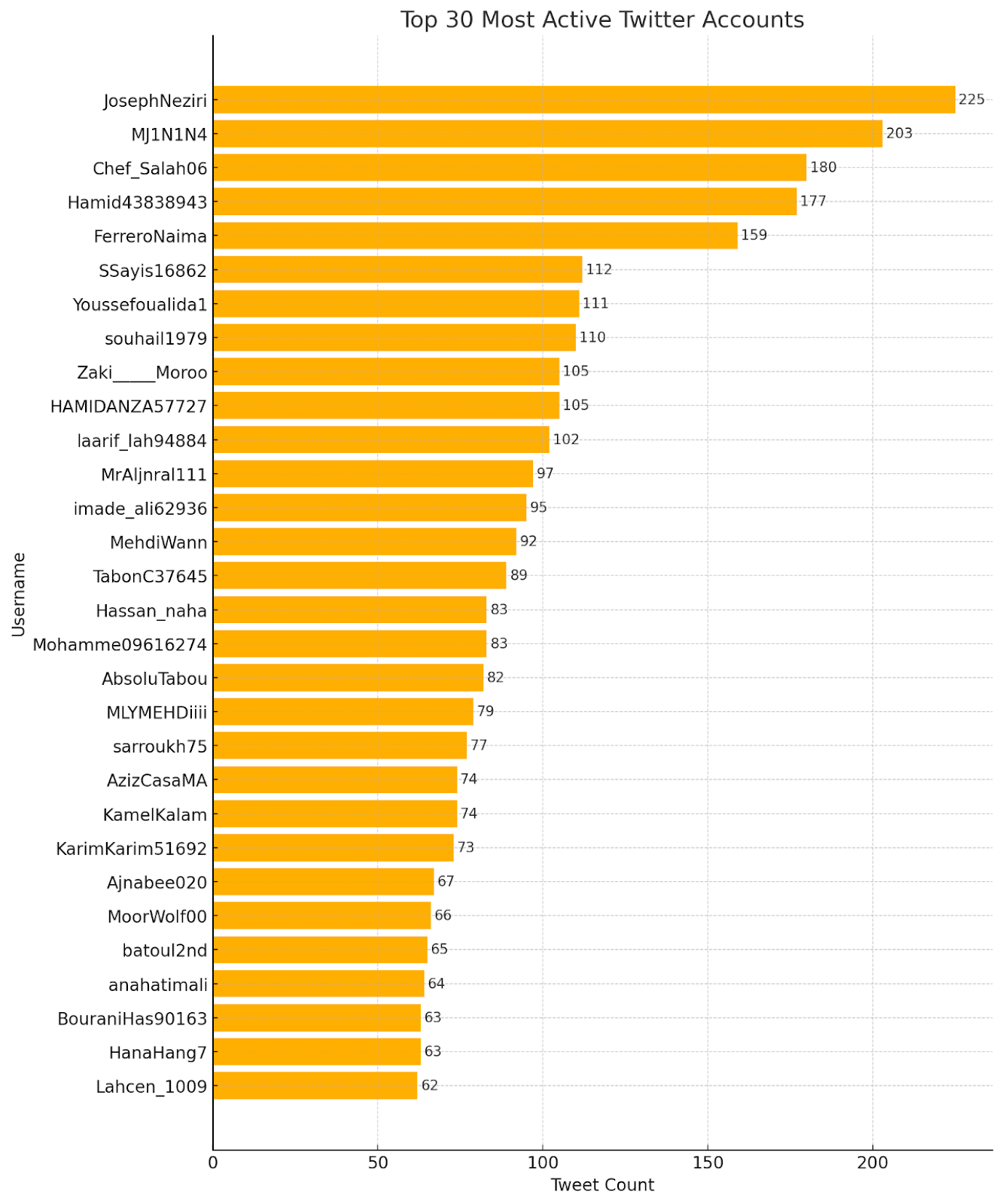
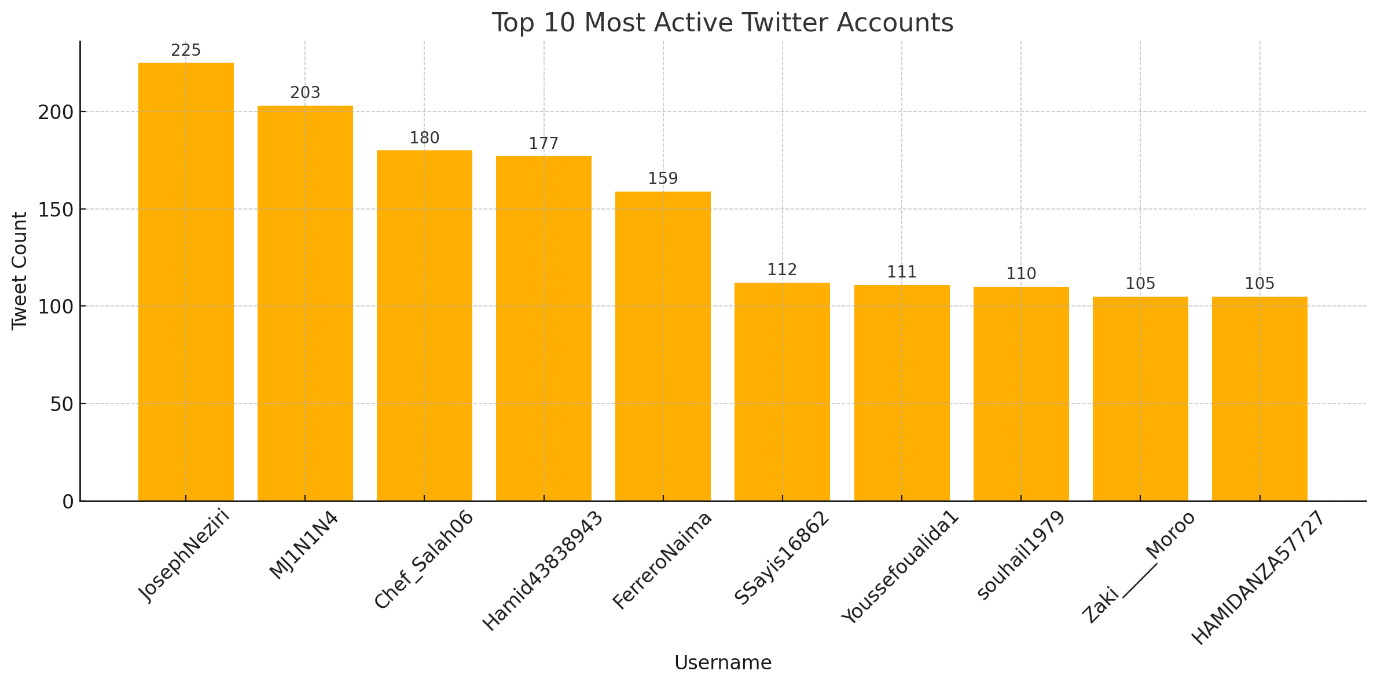
At the top of the list is the account @JosephNeziri, a newly created profile dating back to 2025. It uses a fake name and profile picture. Its activity is almost exclusively focused on attacking Algeria, frequently using offensive language and abusive rhetoric directed at both the state and its people.
.png)
To examine the interaction pattern of the account, we applied a script to statistically analyze its posting times and measure the repetition rate in its posts related to attacks on Algeria. The results showed that the account is active throughout the entire day—a non-human interaction pattern. It also posts intensively during specific time windows with very short intervals between posts. Additionally, the repetition rate in its content was close to 99%, indicating that it is most likely a non-human, automated (bot) account.
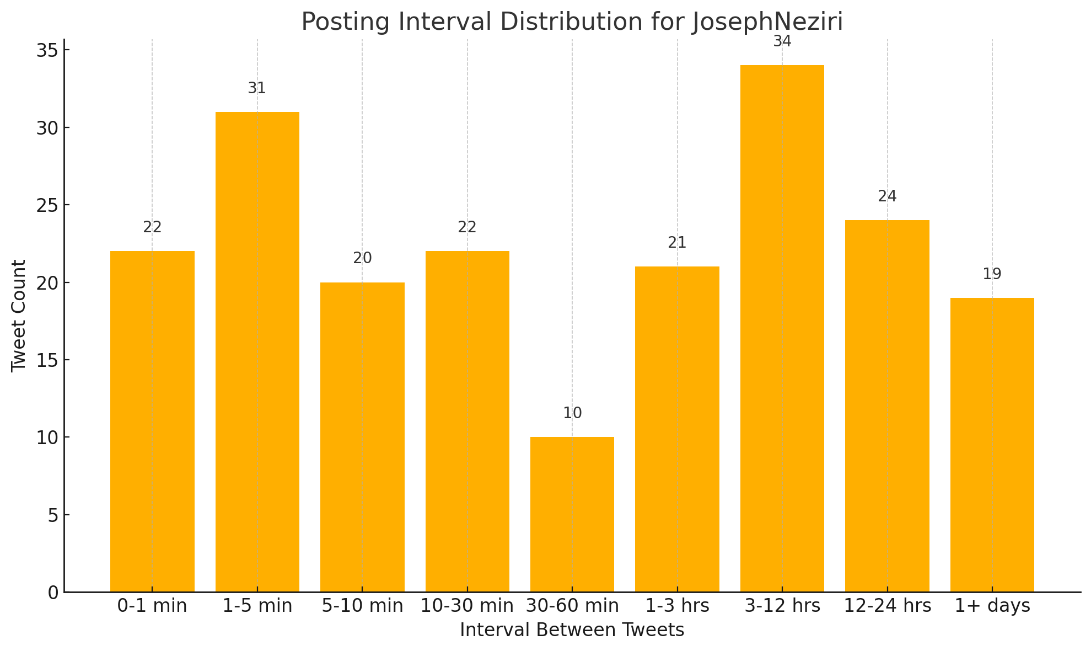
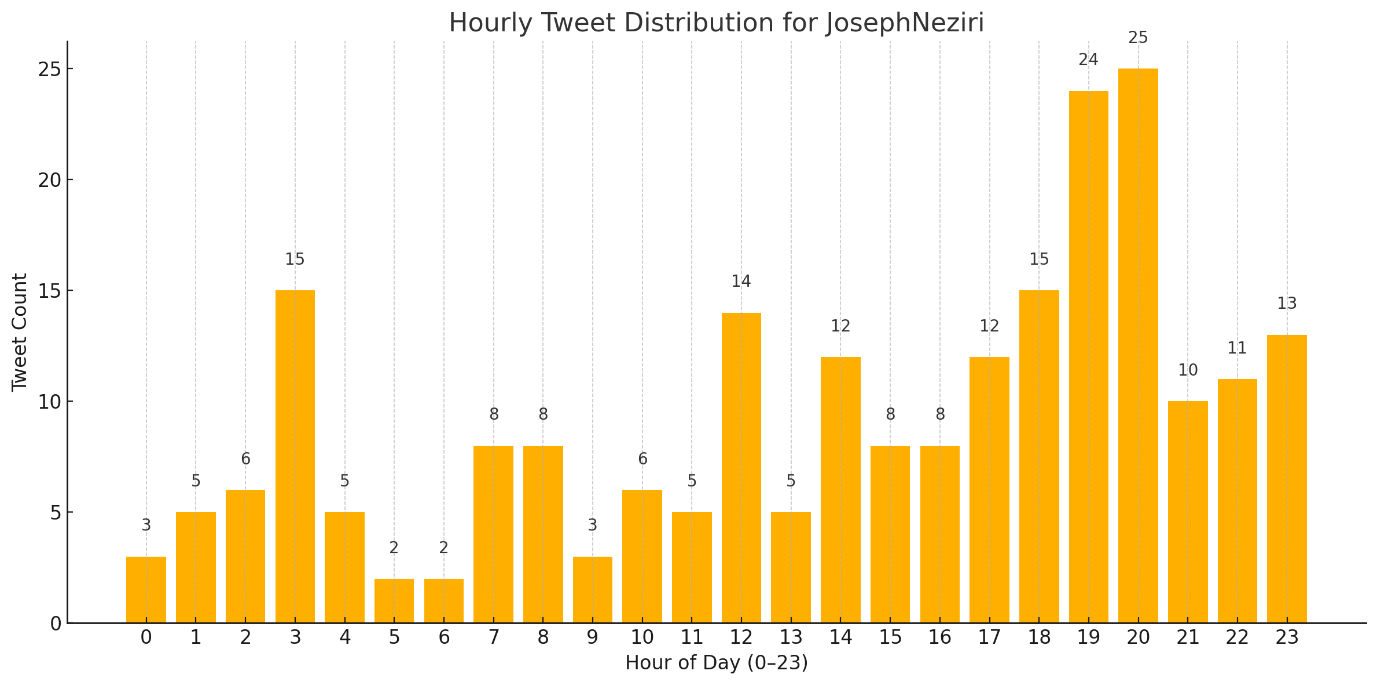
Ranked second on the list is the account @MJ1N1N4, which published 203 posts. This account is also newly created, with its origin dating back to 2024. It is actively engaged in political promotion of Morocco and carries out sharp attacks against Algeria.
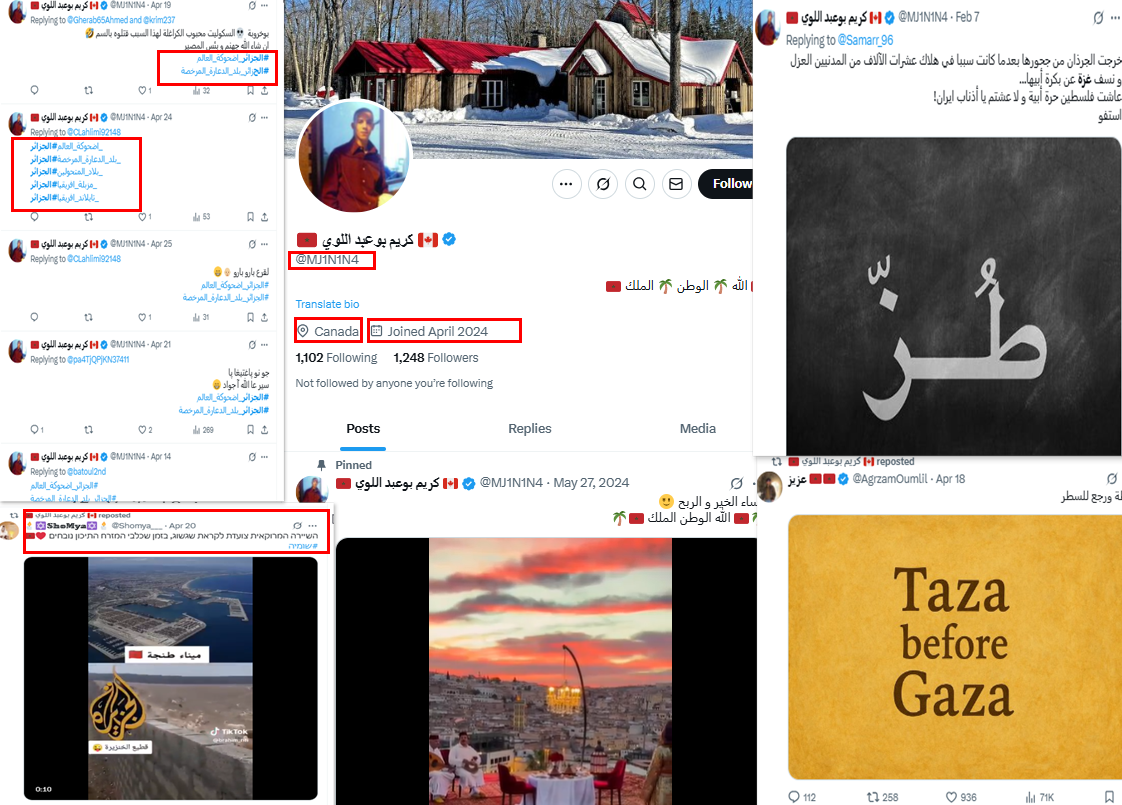
By applying the same script to this account, it was found that @MJ1N1N4 posts around the clock—an activity pattern that is non-human. The account also posts intensively during specific periods with short time intervals between posts. In addition, the repetition rate of its campaign-related tweets reached 97%, indicating that this is likely an automated (bot) account.
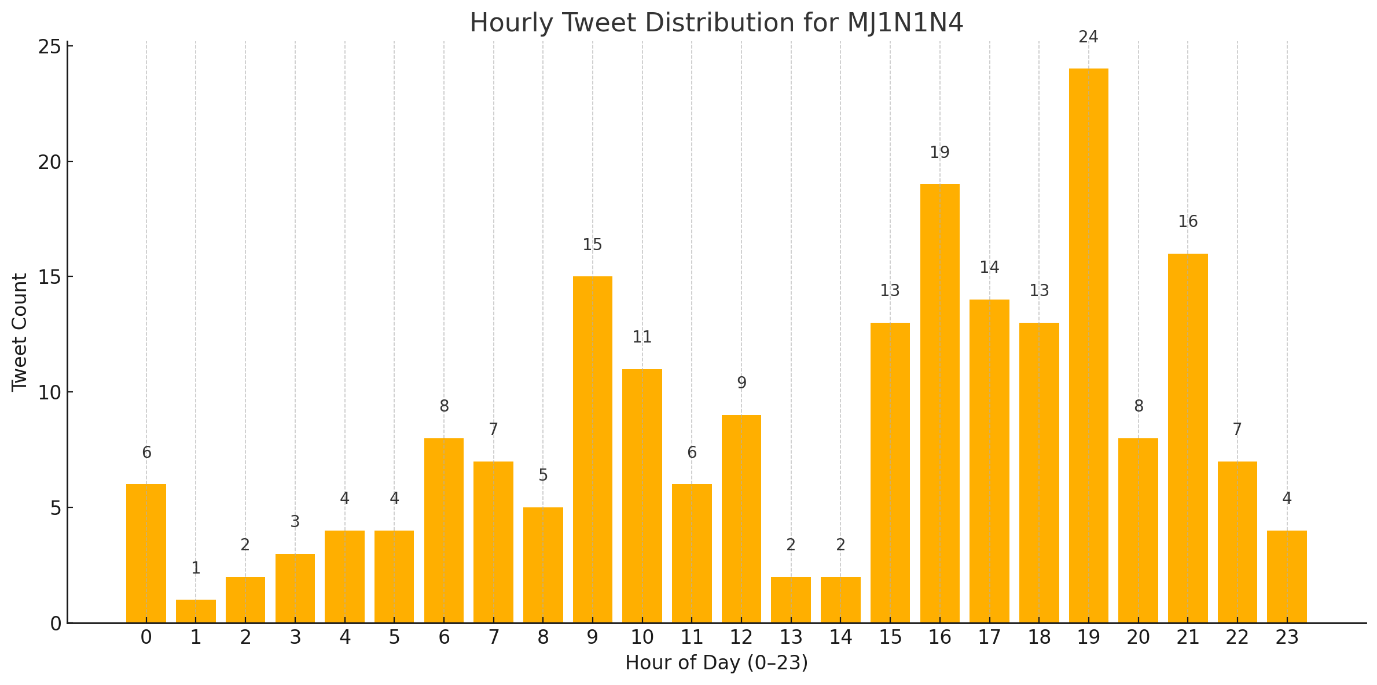
Ranked third on the list is the account @Chef_Salah06, with 180 posts. Although it is a verified account, it is still newly created and lists its location as Paris. Its behavior is no different from the previous two accounts—it is also highly active in promoting Moroccan political narratives and attacking Algeria. The account accused Algeria of sponsoring terrorism, used racist language, and engaged in incitement against Algerians.
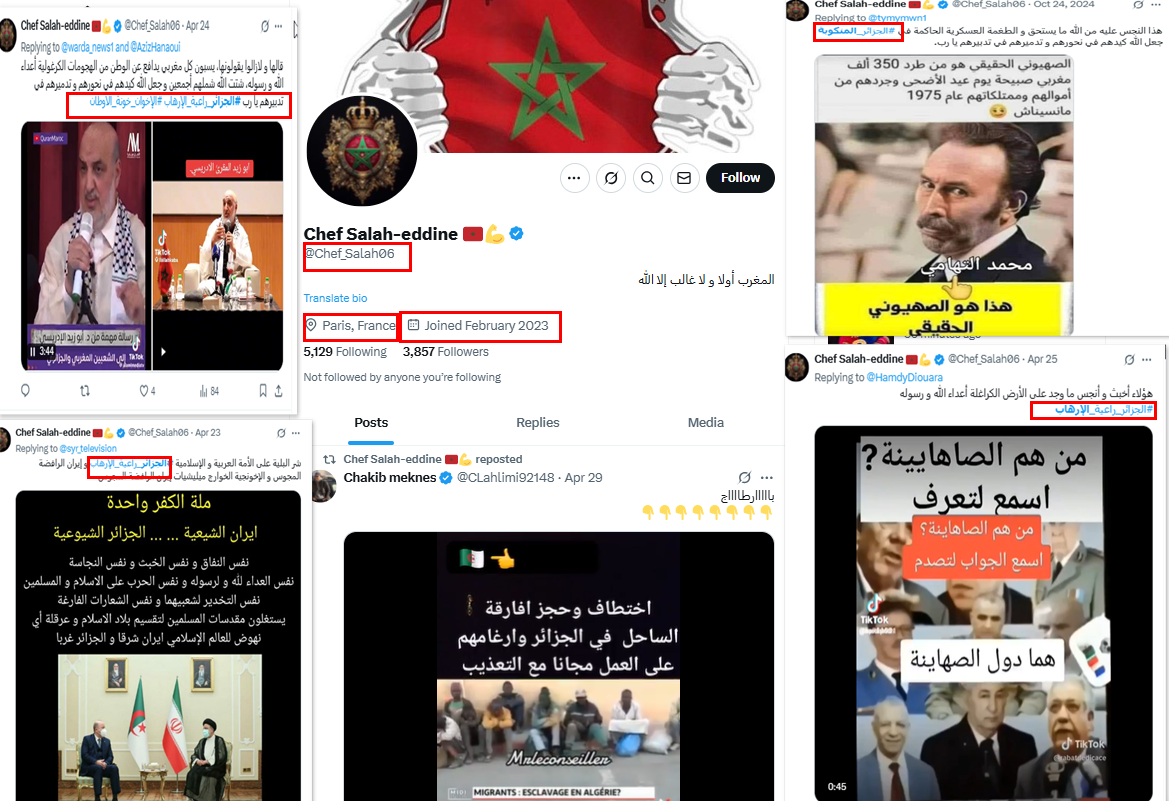
The results of the script applied to this account’s posts were consistent with those of the previous two accounts. The repetition rate in posts related to the campaign was close to 98%, and the analysis showed that the account is active throughout the entire day, posting heavily during specific time windows with relatively short intervals—ranging from 0 to 30 minutes. This strongly suggests that @Chef_Salah06 is also an automated (bot) account.
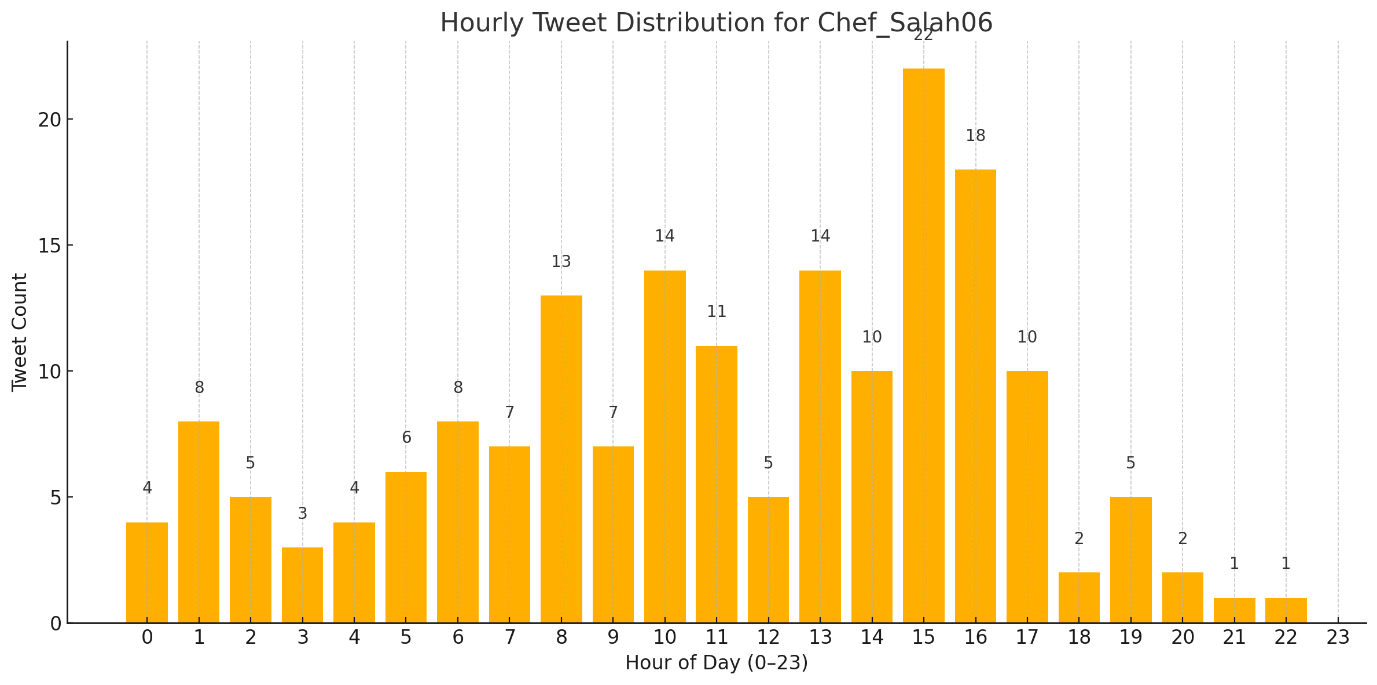
The rest of the accounts on the list of most active accounts did not differ from those we examined. They were all newly created, did not use personal profile pictures, and had usernames consisting of random letters. These accounts were exclusively active in promoting Moroccan political narratives and attacking Algeria, without any personal posts.
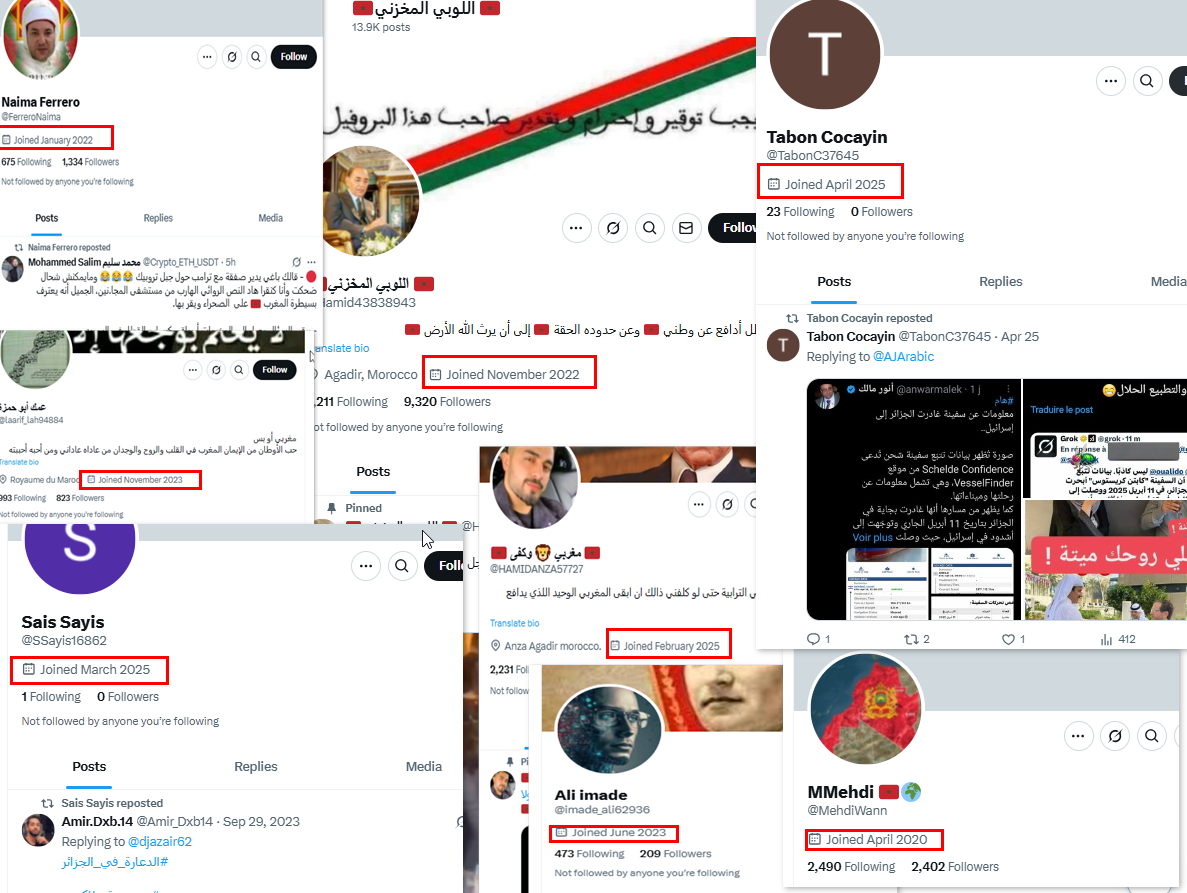
Moreover, all these accounts publish the same type of content and follow identical interaction patterns, suggesting the involvement of a single entity coordinating them. This is the very same pattern we observed in the Algerian campaign against Morocco.
Self-Interacting Accounts for Amplification
After analyzing the data from a sample of posts linked to Moroccan hashtags attacking Algeria, and using the Gephi software, we obtained a network analysis map of the accounts interacting with these hashtags. This map closely resembled the network analysis map of accounts engaging with Algerian hashtags targeting Morocco.
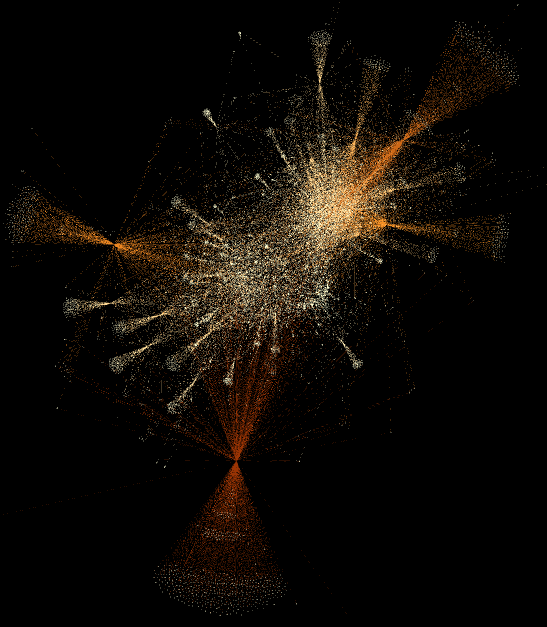
The network analysis map shows a gradient of colors from yellow—representing the least connected account clusters—to red, indicating the accounts most connected to others on the map. The highly connected accounts (in red) are the most influential in spreading the hashtags.
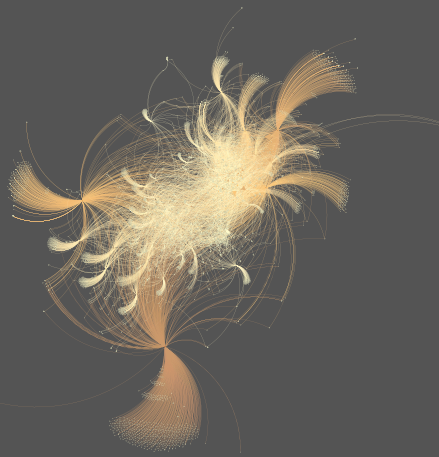
We observe several large networks shaded in reddish tones surrounding the core central account network and connected to most other accounts. This indicates that the vast majority of accounts interacting with the hashtags either reshare content from these central accounts or amplify it through commenting and sharing.
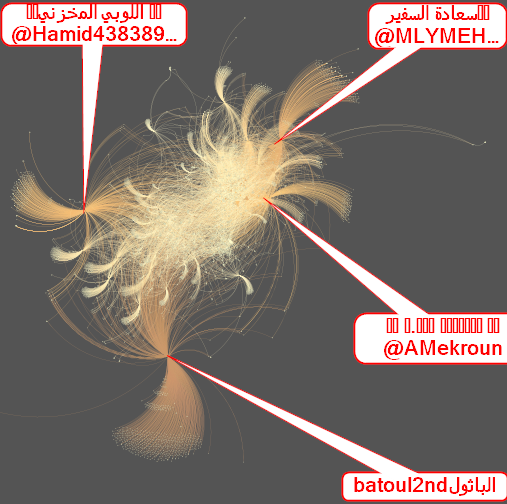
While we revealed the involvement of media personalities’ accounts within the network interacting with Algerian hashtags attacking Morocco, the network analysis map of Moroccan accounts showed a different pattern of activity. The map highlighted four central accounts leading the interaction with hashtags attacking Algeria, with all other accounts engaging with these central nodes.
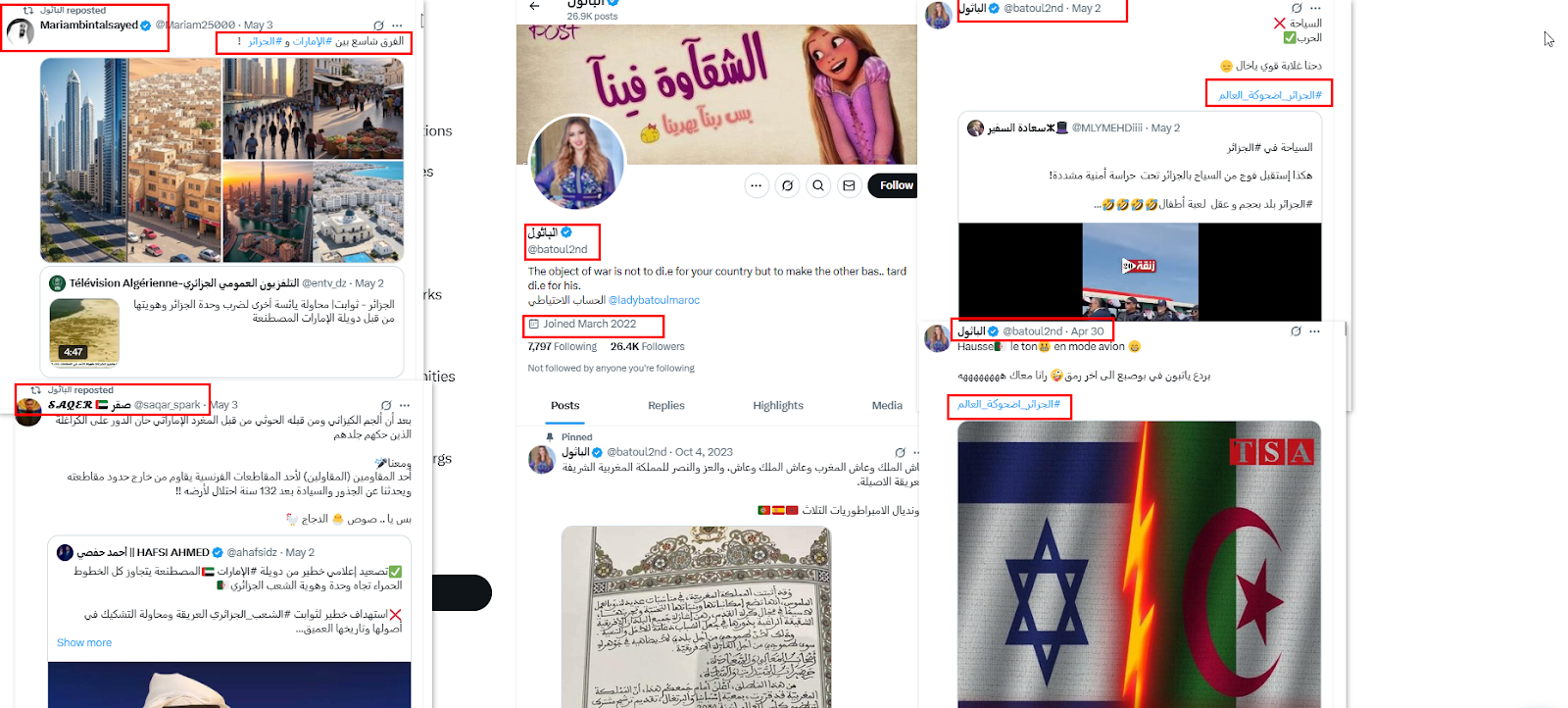
The first of these accounts is @batoul2nd, known as "Al Batoul," created in 2022 and verified. The account does not post any personal content but focuses entirely on attacking Algeria. It notably interacts with Saudi and Emirati accounts. Analysis of its activity patterns—regarding posting times and content repetition—indicates that it does not operate automatically but exhibits behavior resembling normal human activity.
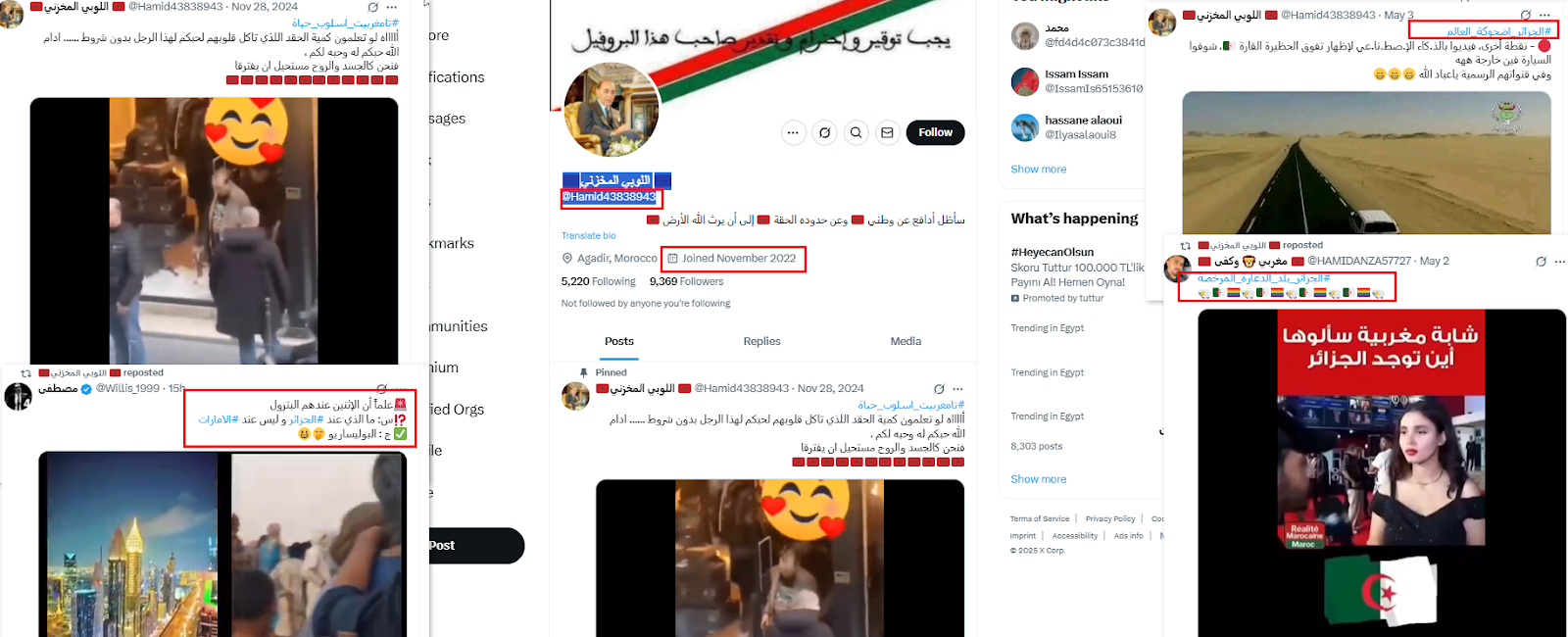
The second account is the pro-Makhzen lobby account @Hamid43838943, which previously appeared on the list of the most active accounts engaging with hashtags attacking Algeria. It is also a recently created account. As its name suggests, although it exhibits interaction patterns similar to human behavior, it is dedicated to spreading political propaganda in favor of the Moroccan regime and attacking and inciting against Algeria.
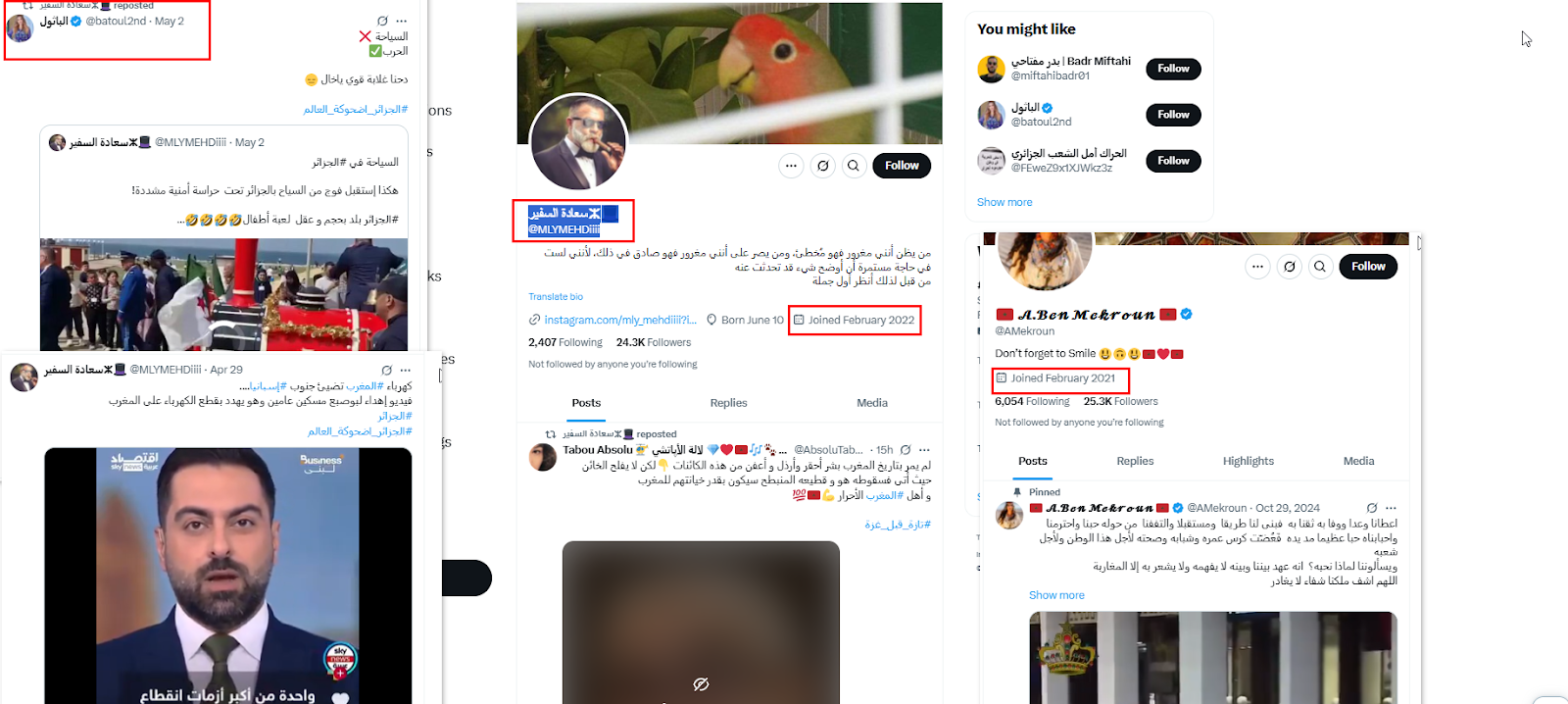
The third and fourth accounts, @AMekroun and Saadat Al-Safir @MLYMEHDiiii, are no different from the first two; they are recent Moroccan accounts without profile pictures but interact in a manner resembling human behavior. They are active in supporting the Moroccan political regime and attacking Algeria.
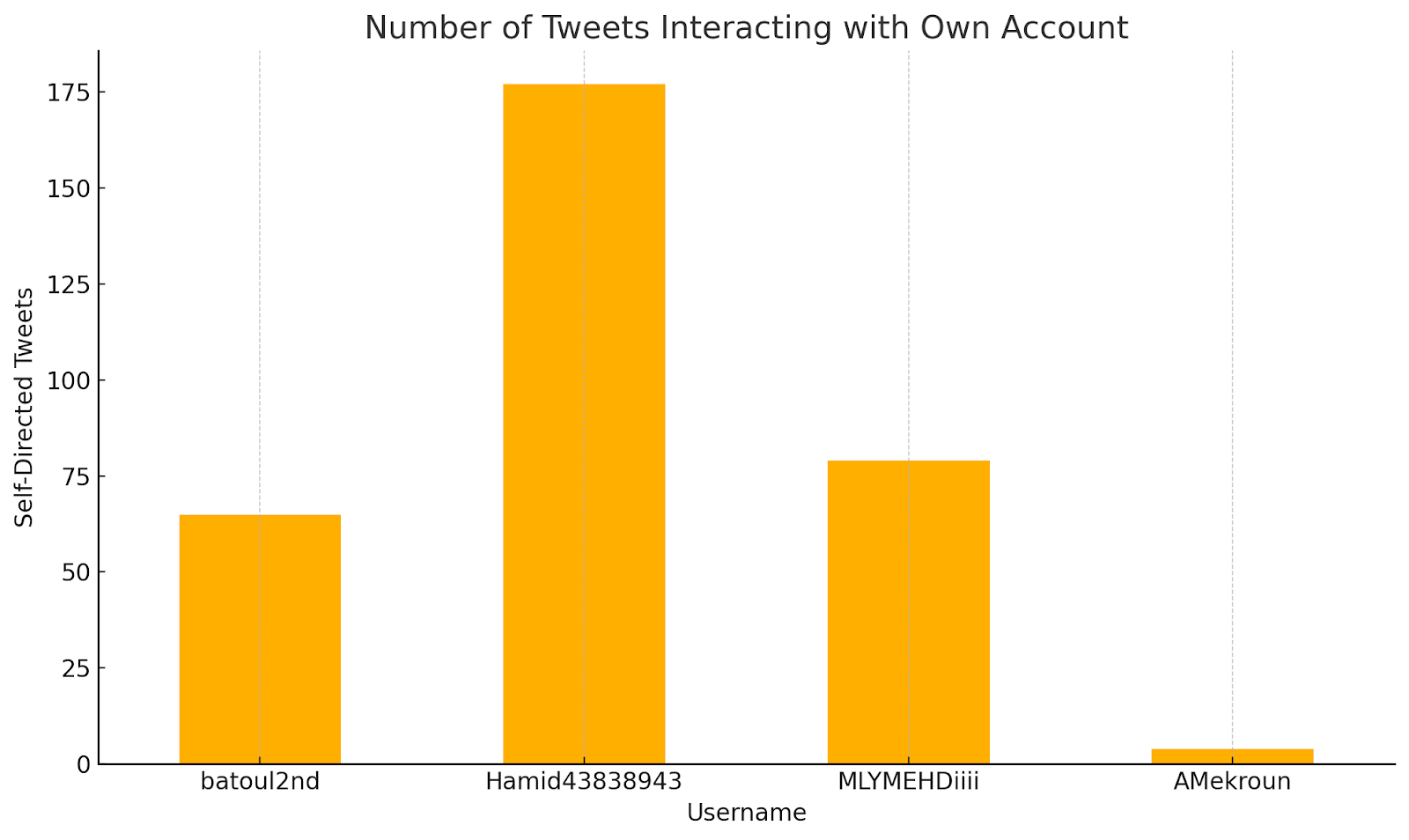
These initial indicators prompted us to conduct a deeper analysis of the activity patterns of these accounts and to identify the list of accounts most engaged with them. The analysis revealed that despite their mutual interactions, the majority of their activity is concentrated in interacting with themselves—they repeatedly share and comment on their own posts before other accounts in the network expand the interaction scope by resharing and promoting their content.
This suggests that these accounts are specifically designed to amplify a particular narrative; they represent a distinctive type of active accounts in incitement campaigns and political propaganda. Their primary function is to broadcast a specific discourse and intensively recirculate it with the goal of influence and amplification, without genuinely seeking interaction with other accounts or expanding their reach base.
